#and i also don't think this is like. a particularly *interesting* comparison. but. it's my blog i get to make the posts.
Explore tagged Tumblr posts
Text


:)
#tma#the silt verses#desc in alt text#in many ways the liars here are doing opposite things from each other (although ofc helen would not have it that way if she could help it)#and i also don't think this is like. a particularly *interesting* comparison. but. it's my blog i get to make the posts.
29 notes
·
View notes
Text
.
#look. i know that it's not a good comparison because i have 2500 hrs in sw/tor and only 10ish hrs in ff/xiv#however. so far. sw/tor just seems far more interesting#maybe it's bc i was into st/ar wa/rs before and don't know anything about fin/al fan/tasy. or the unvoiced dialogue. but it's just... there#it's not *boring* per se. but i don't feel particularly compelled to play beyond 'i wanna see who on earth So-And-So is'#and 'i wanna know what my mutuals are talking about'#like it sure is a game! probably even a good one! but no brainworms#maybe i'm just a bio/ware game addict#because i felt the same way about b/g3. good game! i do not care about it whatsoever#MY OPINION MAY CHANGE BECAUSE I'M LIKE LVL 22 RIGHT NOW#but i wanted to yap about this#also the protag doesn't say anything or make any choices (yet?) and that's. well. not my thing#i think my dad would have liked ff/xiv if it was translated lol. he hates voiced dialogue; choices and cutscenes
6 notes
·
View notes
Text
general thoughts about the 2025 小红书 boom
i feel like we're at a really interesting point in time right now, particularly in regards to the shift in american consciousness + changing world order, so i thought it would be fitting to document my thoughts about the xhs situation as a chinese american. however, please note this post is NOT speaking on behalf of any community, and i am only speaking to my own personal opinions.
the good
american propaganda is getting dismantled in real time. there's so much cross-cultural communication right now in relation to america's political issues, everyday life, and what china is really like
im already seeing people starting to learn the language, becoming interested in visiting china, etc. and i truly haven't seen this kind of mass interest in chinese culture in a long time
to be precise, the last time there was really "chinese soft power" in america was during the mid-to-late 2000s. notably this time period included the 2008 beijing olympics which was monumental for china on the global stage, as it showcased their prosperity, openness ("北京欢迎你"), and equal footing in the modern world. ive seen people compare the xhs phenomenon to this event and while both are drastically different, i do think this is an apt comparison (though obviously this xhs thing is on a muchhh smaller scale...)
so many new friendships and connections are being made!
the bad

to add on to what op said, theres definitely a difference between just generally understanding that as diaspora, most people around you will hold sinophobic views about china and chinese people VERSUS actually having empirical evidence that most normal people didn't see chinese people as human before. its jarring to say the least. like everyone is praising chinese people on xhs now, but just last week everyone was fearmongering about us?? really reminds you that in the eyes of the public, favor for any asian culture (and by extension, its people) is fleeting and will often change easily with the season
and yes, its definitely weird to see people talk about chinese people as if they've never seen a chinese person in america before. like obviously there's a HUGE difference between mainlanders and diaspora, but there's also international students that come to america to study so... ??
the memes are funny, and i like how the people on xhs are playing along with them, but something about the "chinese spy" memes rubs me the wrong way. tbh, most mainlanders actually have a positive view of westerners and america, and if they don't study abroad themselves or know anyone that went abroad, they will never truly understand what it's like to be discriminated against simply for being chinese (there's a difference between knowing and understanding ofc; not saying that they're ignorant & don't know anything lol). this is just the honest truth, just like how i'll never understand what it's like to live and grow up in mainland china since im diaspora. anyways, i kind of question if mainlanders are actually aware of the loaded context behind those words. while americans are using the "chinese spy" memes as jokes now in reference to why tiktok is getting banned, it doesn't change the fact that many other americans truly do believe that there is mass chinese surveilliance/planted chinese spies in america (i.e., see modern-day mccarthyism, like how chinese researchers are often stripped of their titles/reputations, interrogated, and then silently deported). like language and framing does matter, and it has actually affected chinese people in america, but now you guys are treating it like a joke?
anyways, even with all of the bad there's still overwhelming good that has come out of this, and i do feel like its better to be more positive than negative about these things in the long run! who knows where tomorrow will take us but at the very least i hope everyone actively continues pissing off the american government 💖 amen
#cultural exchange#xiaohongshu#sinophobia#tiktok#tiktok ban#2025#my thoughts#eulaties#long post#me: i will not type up my thoughts. i will take my notes for lecture and not procrastinate#also me:
2K notes
·
View notes
Text
I always feel like a little sad seeing posts about how Jason's character is inherently tragic and that's what makes it good, how him being unloved, a tragic consequence of his own actions, is inevitable, and how that shouldn't change because any change on that regard is a fundamental misunderstanding of his character. Yes, Under the Hood is a tragedy. Yes, Jason survived and for a long time people have been pretty confused at what to do with the character that survives the tragic ending. That doesn't mean he should continue to be trapped in the tragedy, that there's only value in him as long as he's unloved. And maybe that's me preaching and being a party pooper again but the idea that the teenage-to-young adult character with a mental illness that has damaged all his relationships is doomed to be lonely and have bad/upended relationships forever, that he's only good as a character as long as he's hurting others and/or himself (and usually both) and isolated because of this... It's sad, at the very least. I refuse the presumption that tragedies are the only stories wise and worth telling.
Also I personally really dislike the idea that Jason isn't and shouldn't be anyone's favourite, because he made himself nobody's favourite on purpose. Did he make himself a villain on purpose? Fuck yeah. Does any of his early attempts at reaching out to people hurt them? Indubitably. I maintain that this is because he wants to be someone's favourite as he is, at his worst, with his hands covered in blood. And I think he should be. (Without contradicting or damaging, by comparison, the relationships between other characters, that's the tightrope we need to be weary of when making such things, of course.)
It's like this: love, in most relationships, is conditional: you don't owe your friend or your partner to continue to love them if the relationship changes, if you change, if you become violent etc. If my girlfriend started murdering puppies, I would stop loving her. Ideally, however a parent's love for their child is unconditional. That's very often unfortunately not the case, but ideally it'd be, it's really not great for a kid to have zero parents that love them unconditionally. And most importantly, it's not just about actual unconditional love, it's about it being perceived. So it doesn't matter in the debate if Bruce actually loves Jason in spite of the murder, it matters that Jason asks for confirmation of it at the end of UTH and receives a negative answer. (similar arguments to be made about Catherine loving Jason and dying of drug overdose and Willis going to jail and dying - it's the potential perceived abandonment of it that would matter, not their agency and actual love. And it's not a question of whether he would be angry at it so much as that he'd yearn and hurt for it. And of course Sheila didn't love him at all.) That's why he, upon learning about Mia and reaching previously unknown to man levels of projection*, tries to rally her with the hope that, because she's "so similar to him" she would understand him. That's why upon learning about Dick "killing" Blockbuster Jason, again projecting more violently than a bullet, Jason makes Dick into his new favourite person (god, the concept behind BiB has so much potential why did it have to suck so bad...) Anyway, Jason to me is a character with a very intense, very overwhelming conception of love both in who he loves and how, who struggles to understand that other people love and show it differently, and it makes so much sense for him to keep looking for a person who will love him unconditionally (something that's both very rare and not necessarily healthy since, again, most relationships aside from parent-child relationships do not and probably should not include unconditional love). This is particularly interesting in the context of him having bpd (again, using bpd because i'm focusing on the interpersonal dimension that's been mostly studied within that frame) because BPD often functions around a vicious circle of "is afraid of rejection/abandonment -> does maladaptive behaviour in attempt to prevent rejection/abandonment OR protect oneself by being the one to leave first" which is what leads to the instability in relationships. It's a doomed prophecy: i have maladaptive patterns that make me think my girlfriend is gonna leave me at any time, I keep demanding to see her phone, assuming she's cheating everytime she leaves and thus demonizing her even though I was glorifying her five minutes earlier" then she's going to leave me, which is gonna reinforce my thought pattern that everyone always leaves me. But that also means that in rare instances in which the other person in the interact, for whichever reason, sticks around through that, then these incorrect thought patterns begin to change through the sheet logic of extinction: if i think that people always leave me because of something fundamentally wrong with me and people don't leave then eventually the idea that people are doomed to abandon/reject me is going to lose its power. That's, btw, an important part of why therapy works.
(*that one's a joke, btw. He's not projecting onto mia and dick to levels impossible to mankind, just pretty intensely. Very human levels of projection, might I add'. Just to clarify.)
Now, be mindful: I'm not saying make Jason an abusive boyfriend. I'm not saying put him in a relationship where the other stays because they're afraid of him, that's not unconditional love or acceptance that's just fear. Of course, the ideal version of it would be Jason goes to therapy but because dc hates me specifically this is never gonna happen, but imagine him being in a relationship, romantic or otherwise, with someone who is as intense and "unwell" about him as he is about them. I'm not saying it would fix him (again, get him so goddamn therapy jfc) but it would change him. And just as it doesn't have to be healthy it doesn't have to be tragic.
I was asked a while ago my thoughts on Jason's current stagnancy as a character and if I thought he could become interesting again, and I said yes and talked about the directions I dream would be explored with his character and their potential. My answer hasn't changed, and it's completely compatible with this, but I will add: I think Jason as a character has largely and for long enough been defined through his yearning to be somebody's favourite, and that if you want his mode of interacting with others and dynamic with different characters to change then this is a very logical way to do it. And it would make a lot of sense for it to be the catalyst for other changes in his character (ie in his name or philosophy).
Get that boy into a super intense long-term codependent situationship, is what I'm saying. Please.
#dc#jason todd#dc comics#red hood#i'm only talking about Jason's part in this and not who I think would fit best in that context#even though I already have a candidate in mind#because it needs to be equivalent exchange for the characters too.#aka i need to be sure it'd be interesting for this character's arc to be this intense towards him as well#and so further research is needed before i'm sure of my answer#jason todd meta#this was supposed to be two sentences if you can believe it
206 notes
·
View notes
Text
i'm always really interested in how the characters call each other in japanese games, so i laid out a few differences between the japanese and english versions of some ace attorney games that particularly interest me. this isn't meant to be an exhaustive list but it did get really long 😭
i highlighted english nicknames/etc in blue while japanese nicknames/etc are orange just to make reading a little easier
AA1-2
while only playing the english version i liked that maya called phoenix nick, it's a nickname that makes sense and phoenix is annoying to say and write anyway (lol) but the reason maya gives for this nickname in english is that it's what larry uses for him, which pales in comparison to maya in the japanese version opting for how mia used to call him: naruhodo-kun.

to me, this is a LOT more meaningful and informative than the english nickname because it not only is evidence of how much maya heard about phoenix from mia using that nickname, it also gives us a glimpse of maya's personality and her relationship with phoenix. -kun is an honorific that's usually used for either male classmates or for teachers/superiors to use with their students/subordinates. maya falls into neither of these categories with phoenix, but it also lines up with how she acts like the boss of the office a lot of the time. SO LIKE... ultimately the nickname nick just does not hold up in terms of both maya's reasoning for using it, and phoenix's apprehension at her calling him that... which i just think is a shame!! in the same vein, this nickname is passed down to pearl, and again you see phoenix having a Reaction to it which makes sense considering it's funny that a kid is calling him naruhodo-kun...

i don't only want to talk about changes in english that i don't prefer, so i also want to mention that i'm very impressed that they managed to get phoenix and edgeworth referring to each other by their surnames in english to sound natural... because it's also exactly what they do in japanese except there, the idea of male friends using their surnames with each other is a very very normal thing. i AM torn on the fact that in japanese larry also refers to the two of them by their surnames, which means all 3 of them are on equal grounds in that respect. AT THE SAME TIME... english makes larry's "nick" and "edgey" work so well that i really can't say we missed out with this localization, but i do like the relationship between these 3 so i do like that the japanese is indicative of it too :)
AA4
i'm skipping ahead to aa4 because trucy's also a very interesting localization to me... the first time i played aa4 i felt like trucy wasn't sufficiently differentiated enough from maya's character which is like. debatable but those were my initial thoughts anyway. in japanese though she uses third-person pronouns (calling herself by her own name, minuki) which is VERY distinct from maya. there are a number of ways to interpret this choice but i like the one that indicates that it's part of her stage persona. aside from that though, she also has a very normal nickname for apollo (odoroki-san, with -san indicating general politeness) while polly is um well canonically the name of a parrot LOL

i do find it pretty interesting that the above exchange is the first instance trucy uses the polly nickname, because it's entirely different in the japanese version. phoenix says "if this onii-chan over here can't help you..." to which trucy responds by saying "how could you, onii-chan!" this exchange is hilarious to me because phoenix referring to apollo as an onii-chan is pretty normal? it's common to refer to any young man as that and in this case he's also referring to apollo from trucy's perspective. but trucy DIRECTLY calling apollo onii-chan (brother) is just so funny because HERE it's a lot closer to how an actual younger sister would refer to her older brother; there's a difference between saying "this onii-chan" and just "onii-chan". now i'm not saying this was direct foreshadowing because onii-chan is also used between close friends/acquaintances but like... the possibility is there.
AA5
now onto simon because i don't actually have a problem with the localization making him a british weeaboo i think that's really funny but i DO wish the nicknames he uses for the defense attorneys were more... appropriate? the honorific -dono that he uses in english does complement his samurai look but it's usually used in contexts where there's some respect involved, which is... not simon's intention in japanese. i'm admittedly not too familiar with the nicknames he uses in japanese; he uses "[kanji] no ji", while using a kanji from phoenix/apollo/athena's surnames. by searching it in japanese, i'm finding answers that it was medieval slang used by men usually in red light districts and such, and was used to refer to those with equal or lower status to oneself but never to those of higher status. this is kinda the opposite of what -dono is which is used for those of equal or higher status!!
i also find it pretty amusing that despite him using the first kanji in phoenix's name; 成 (turn into, grow), he uses the second kanji in both apollo and athena's names; 泥 (mud) and 月 (moon) respectively. i can only imagine that he did this because the first kanji in their names; 王 (king) and 希 (rare, hope) respectively, were too positive/complimentary for him? LOL
AA6
now i want to to talk about apollo in aa6 because NNGNRHGH i'm not normal about this one. because like, similarly to what i said up there about phoenix, edgeworth and larry's relationship, it's completely normal for close male friends to use their surnames with each other. phoenix, being apollo's boss, refers to him as odoroki-kun (mirroring how mia and maya call phoenix). trucy uses odoroki-san, indicating general politeness and athena uses odoroki-senpai, because he's her senior in their workplace. clay uses odoroki (no honorific), which is the same "level" as phoenix/edgeworth/larry's relationship.
a male character never being referred to as their first name is pretty normal, which is also the case in the aa games. franziska calls edgeworth by his first name reiji which is SUPPOSED to stand out because it's notably impolite/informal for someone who is younger than him, which suits the idea of her thinking of herself as the elder sibling. for additional reference, phoenix is only referred to by his first name by dahlia/iris; ryuu-chan ("feenie" equivalent) and desiree; ryuuichi-kun ("nicky boy" equivalent). so apollo is referred to exclusively by his surname, because there isn't anyone who's associated with him who would feasibly use his first name.
THAT IS. UNTIL we meet datz who is the first (!!) character to use apollo's first name in japanese. this moment doesn't stand out in english because i KNOOWWW datz uses the AJ nickname which is very cute but he doesn't actually use that nickname the first time he indicates that he knows apollo in case 6-3!! phoenix's momentary confusion here is also explained because while he obviously knows apollo's full name, he's never heard anyone refer to him with it!!!

so phoenix's thoughts in japanese here were originally "housuke... wait, that bracelet! that's odoroki-kun!"
dhurke and later nahyuta (during the last moments of the 6-5 trial) also refer to apollo with his first name, which is... really nice!!! they're family!!!! i mourn the fact that this distinction isn't visible in english because most characters just call him apollo but it's special in japanese... it's only dhurke, nahyuta and datz who use his first name.... i'm normal i promise
funnily enough i sort of have the opposite issue with nahyuta, who is generally referred to as prosecutor sahdmadhi in english but nayuta-kenji (prosecutor) in japanese. i'm assuming this is because his name is written with his given name first unlike japanese names, so they just used his given name instead of his surname...? unfortunately we don't have an example of any other foreign prosecutor as reference (i'm excluding van zieks here because they DO use his surname but it's also an entirely different time and place) but i prefer the english here since it also makes it stand out when apollo, dhurke and datz (with yuty hehe) use his first name with him.
but then again... rayfa also refers to him as prosecutor sahdmadhi in english, but just calls him nayuta in japanese. there aren't a lot of characters rayfa refers to by name but generally she's either overly polite (with ga'ran and inga) or overly impolite (with phoenix and apollo). it makes sense that the way she calls nahyuta is a little unique, since he's of lower status than her but not enough to get a rude nickname fdjhja... and then of course at the end of the game she tries to call him onii-(chan? san? sama? we just don't know) which nahyuta interprets as oni (demon) i think the localization here is really impressive actually. they somehow managed to seamlessly fit braid head into the mix of barbed head and horn head (both nicknames that refer to their hairstyles) while braid also begins with the same letters as brother... anyway i think i slightly prefer that rayfa (and ga'ran) call nahyuta by his first name rather than by his prosecutor title, it's indicative of their higher status because of the lack of an honorific but by the end of the game it fits in with the idea of them all being family...
TGAA1-2
you would think that because tgaa opted to leave japanese honorifics in the dialogue that there wouldn't be any differences in how the characters refer to each other but there are... first of all kazuma and ryunosuke are once again male friends who refer to each other by their surnames without an honorific in japanese, but the english has them use their first names with each other instead. i can understand this change because characters using only their surnames with each other feels oddly distant in english, and while it worked for phoenix and edgeworth's relationship it definitely doesn't suit kazuma and ryunosuke's.
additionally, the way susato calls ryunosuke was also changed from naruhodo-sama to naruhodo-san. this is... also an interesting change since it requires the player to have some basic knowledge of japanese honorifics but for some reason decided to change it anyway, despite the fact that susato also uses -sama with kazuma... one thing to note is that susato does use kazuma's first name instead of his surname like she does with ryunosuke, which helps indicate their closer relationship despite her still showing respect with the -sama honorific. in that sense naruhodo-san feels like an interesting middle ground because she's still using his surname but doesn't seem to view his position with her as equal to kazuma's? i assume that was the intent of the localization, similarly to how the way kazuma and ryunosuke call each other was changed to indicate closeness to the english-speaking player
--
anyway while i do prefer the original japanese version most of the time, my general view of original vs localization is like wow! two cakes! i might prefer one of those cakes more, but the english version usually provides enough that i like that both canons exist. because of this i can't agree with the idea that all localization is bad nor the side that believes the original doesn't matter because you're engaging only with the english side of the fandom. both are good and can reveal interesting things about the characters, story and setting!!
and thank you for reading if you got this far 🙇 i'm not an expert at japanese so i try to do my research and use multiple sources to get a better view of things, so please let me know if i got anything wrong! i also recommend checking out this post if you haven't seen it already since it's where i got some pointers on the trucy and simon segments
#satsusays#ace attorney#the great ace attorney#phoenix wright#maya fey#larry butz#miles edgeworth#trucy wright#simon blackquill#apollo justice#nahyuta sahdmadhi#rayfa padma khura'in#asougi kazuma#mikotoba susato#naruhodo ryunosuke#'only the parts that interest me' consists of more than you might believe but still that's why the aa6 section is so long .#no particular aai thoughts on this for now but who knows... i'm blaming the lack of siblings <-?#i know similar posts probably exist out there but these were some of my own observations...#satsuTL
204 notes
·
View notes
Note
If i ask nicely, would you consider writing the core of Light and L character like you did for Shuake? (IT'S BRILLIANT BTW!! You're so galazy brain. I love reading any meta or just silly posts you posted here <3) because you mention Light a couple time in Akechi's part and now i need to know your thought on him and L.
(Also, about the death note wip you're cooking right now, is it a oneshot or multiple chapters fic? Im super excited for it!)
i ABSOLUTELY would thank you so much for asking and for your lovely kind words. and im sorry this took me seven years to get to i just kept psyching myself out.
here's the ren & goro post this ask refers to for anyone wondering. the 'core' refers to my answer to a writing meme:
26. What would you describe as OOC? [...] it's the same approach i take to language tbh particularly in pronunciation. once you understand how a language forms its sounds at a base level, you dont struggle with the accent on particular words, and you can encounter words you've never seen before and understand how they're likely to be said/spelled/etc. so once i learn to 'speak' a character they come more naturally. idk if that comparison makes sense to anyone else but it does to meeeee all this to say i think a character is ooc if they do or say something i cant reconcile with that core!
the death note wip is a multichap!! thank you for your interest!!! ill talk about it more once i've stopped tying myself in knots plotting it!! broadly it's a what-if type au which has led me to replot an entire series from scratch dont look at me
anyway lawlight below. i will say ive been really desperately wanting to do like a video essay or something about death note which would be a lot about L and light specifically and how i interpret their characters so ill try and not go toooooo insane in this post but maybe ill go more insane later. in a video. with my human voice.
(edit: i failed i went insane)
light - one-way road to the sky
ok let's talk about one of my favourite scenes of the entire series, which i think is widely not super well understood but honestly to me holds the key to light's entire character. it's right there in volume 1

sorry, the only digital copy ive got on hand is the scanlation. for comparison the official print copy reads:
bubble 1: hey, maki, wanna party tomorrow with some guys from s. college? ten o'clock. bubble 2: yeah, totally! bubble 3: hey, can i go too? bubble 4: my mom isn't here yet? what's that nag doing, geez! light (thinking): damn... light (thinking): start looking around you... light (thinking): and all you see are people the world would be better off without.
this happens within the first 40 pages of the first volume. and it's like. haha hey light what the fuck? this is a totally normal scene in everyday life. people are talking about living their lives. nobody's done anything remotely reprehensible in this scene. and light's just walking through the streets experiencing apparently unprompted and quite extreme misanthropy. what's wrong with him
ok let's have a quick look at the first time we meet light in the anime.


[...]

[...]


cool cool cool im gonna pivot again let's look at the first song (besides the overture) in the musical.

ok rook! we get it! light yagami is out here like damn we live in a society time to kill people about it. this is news to nobody! we all know this!! that's what the series is about! why are we rehashing all of this
great. cool. awesome. let's look at all those scenes one more time. but this time don't look at light. instead let's look at the people around him
in the opening shots of the anime (after the shinigami world, which actually is much the same theme): news of brutal murder is narrated over establishing shots of tokyo. light is shown dead-eyed, going about his ordinary life, surrounded by random other civilians doing the same thing.

in the musical, light isn't angry that murders happen. he's angry about the inaction and complicity of the ordinary people around him.




these scenes aren't highlighting that light thinks crime is bad. we all know crime is bad. the point of these scenes is to contrast light's frustration and fury against the reactions of the people around him. here's what light yagami is seeing: we're surrounded with rot. but nobody's reacting. and then life just goes on. so suddenly all those completely normal scenes of people being concerned with the superficial details of their life aren't just normality, they're complicity. day in, day out. so the world is rotting, and to light, it seems that everyone is completely ok with that. that's just the way things are. and that disgusts and depresses him. on top of than that, it isolates him: he feels like he's the only one who sees or cares about this, that everyone dismisses him as naive, that no one else can be trusted, that everyone else is able to ignore something he sees as inexcusable. this is a sentiment he repeats again and again. it reads as arrogance, and it is, but it's also isolation - after all it's lonely at the top and just as lonely to feel like you're at the top even if you arent
can i talk about the iliad again? is that ok with everyone. im gonna talk about the iliad again
in book 1 of the iliad, the commander of the greek army insults achilles by publicly and unlawfully taking a prize (the girl briseis) who rightfully belonged to achilles. achilles reacts by withdrawing his troops from the army, dooming the greeks' campaign. achilles had a lot of friends in the army, so why would he essentially sentence them all to death for something that only agamemnon did? well, (because agamemnon did something publicly that everyone knew was wrong, and yet nobody was willing (or at least able) to stand up for achilles and stop it from happening. achilles, disgusted by the inaction of the bystanders, turned his back on all of them. fun fact i nearly wrote a mini thesis (an academic one not just a long post on tumblr) about the intersection btwn this book of the iliad and legal theory but law+classics is such a niche interdisciplinary field my professor couldnt find anyone who could supervise me so i couldnt do it. anyway that's not the point
is this right or fair? who cares, not the point. what im interested in is what that kind of behaviour says about the individual. light, like achilles, is a highly idealistic person. we all know that in the abstract, but take a second to really really dig into it, because it's actually quite an interesting fact about a character who is popularly understood as being cold and unfeeling or flatly psychotic and on a power trip. idealism isn't naivety, it's not optimism, it's not even really a happy thing. idealism is simply a firm belief in the way things should be at the cost of refusing or being unable to accept what is.
this is the core of light yagami to me. light doesn't become kira because he's cold or destructive or crazy. he doesn't actually even do it because he's spiteful or misanthropic. it's very much the opposite. he's misanthropic because he believes in the world so much. isn't that a great contradiction! ok here i'll show you some proof.
in an early scene (also in volume 1), light describes himself as an optimist and ryuk finds that interesting.

so light is an optimist. he believes in a bright future for humanity. he wants to protect humanity. he likes humanity. no, he doesn't believe that people are inherently good, but he does believe in some goodness as a part of humanity and wants to protect the best of people, in an egotistical way:

how do we reconcile that with a young man who walks through the streets listening to completely ordinary conversations by ordinary people and reacts by wishing death on everyone talking?
let's split out what's going on here. remember what's happening in light's head. light yagami is 17 years old. he grew up with a police chief for a father (in a fictional world where the police are the literary stand-in for law as justice so just pretend for a second that police are good im sorry), watching his father work tirelessly to fight crime - but crime continues, making this an endless, thankless task. and while crime continues, so does the world around him. every day light sees atrocities on the news, and he sees atrocities brought home, and then he lives his ordinary life and watches the people around him apparently not give a shit, only concerned with the petty details of their own little lives. bystanders watching wrong happen, selfishly unaffected. day in, day out. that idealism is getting colder the longer this unendurable injustice goes on. so achilles condemns his friends to death.
what human trait is being exhibited? realistically it's helplessness. would being miserable about crime help to end crime? of course not. people have to go on with their lives, that's a fact, it's even a strength. even light begins the series completely unable to do a thing about the rot he sees around him, which is part of why he's so depressed. but that's not what light is seeing. light is seeing ordinary people appear to choose not to give a fuck about injustice. the thing that's sparking his disgust is apathy, real or apparent. light yagami is an idealist. he wants a better future - a utopia that only he can imagine - something that can only happen if either everyone becomes as good as he is, or he takes control.
if you leave an idealist in an unwinnable situation for too long, their pure belief will start to curdle. it will not turn to realism. they will not accept what is. they will only become more and more bitter that what should be, isn't. they will become a cynicist. this is really the heart of my argument and ive made it a million times and ill make it again. idealism and cynicism are not opposites, they're not even two sides of a coin. they are two points on the same line which moves very quickly in only one direction. this is where i start when im writing him: how do i make someone who believes so hard that it's killing him? someone who believes so hard it makes him believe in nothing?
then we find the third point on that line, which someone can reach by gaining sudden power - for example, a magic notebook that kills people: radicalisation.
how do we reconcile his desire to protect humanity with the fact that what he's trying to protect against is also humanity? how can i say light loves humanity when he has such disdain for them? easy peasy: light sees himself as the messiah. my bumper sticker that says ask me about light's martyr complex PLEASE ask me about light's martyr complex i wrote a song about it ask me about light seeing himself as the sacrificial lamb on the (and then the bumper sticker cuts off)

light loves humanity the way a twisted shepherd might love his sheep. something to be protected, but something beneath you that can't be trusted to know what's best for them. humanity is something he loves because it's endearingly pathetic, something to pity and save. repeatedly he refers to becoming kira as a personal sacrifice, something that costs him his soul but that he has to do. it's a delusion of grandeur driven by dual purposes of ego and some desperate wish to change a status quo he's been despairing about for years.
tl;dr: light believes with all his soul in something he thinks is impossible, and it's killing him slowly, and then a chance to change the world just falls out of the sky
L - isolate yourself until you can make believe it's just a game
steeples fingers. i have Things to Say about L Lawliet.
ok listen. listen. Listen. listen. are you listening? listen. in general i think people kind of misunderstand characters who are hyper-intellectual and/or behave unconventionally in social settings. you're all going to fucking kill me for this but i think there's a tendency to like... accidentally turn any character who falls vaguely in this broad category into sheldon cooper. god im sorry i feel like i just shot everyone's collective dog
specifically what i mean by that is that 'awkward' gets flanderised in a way that eventually becomes a caricature of itself, because there is so much nuance to actual social awkwardness that it's very easy to kind of pick a template and stick to it without really thinking about what makes that character 'awkward' and what the root and type of awkwardness is, unique to them. so instead we just get, like... generic big word user. generic driven by logic and logic alone guy. generic guy who doesn't Do Well with other people, for Smart Reasons.
here's a list of true things about L which i think are safe to say are uncontroversial
intuitive
logical, master of deductive reasoning
competitive
behaves in an odd way that draws attention
is aware of that fact
focuses extremely hard on his cases and only cares about being a detective not anything else
isolates himself and doesn't like talking to people partly for his own safety partly because it's boring to him
here are things i have seen in characterisation of L which i would like to dispute
makes decisions and draws conclusions based solely on logic and evidence
doesn't understand social cues
here's a list of alternate interpretations which i would like to propose and that i am willing to back up with evidence and/or by physically fighting over them
is driven primarily not by logic or evidence, but by incredible intuition which is supported by logic and evidence when it suits him
has a keen understanding of people, interpersonal relationships, and social norms
leverages that understanding frequently to his benefit
feels that he is not capable of / not a part of emotions that he sees as being typically human (see his speech about being a monster)
and yet in an abstract and self-contradictory and low-priority way still kind of desires connection, leaving him emotionally isolated
chooses to behave oddly on purpose, not because he doesn't realise he's behaving oddly, but because it is not a priority for him
those might seem like fine distinctions at some points, but stray slightly off the mark and his characterisation begins to vary wildly. for example, interpret L as being bemused or unaware of social cues, and one possible characterisation that may stem from that understanding (which i have seen) is that L doesn't understand sarcasm or jokes - which is demonstrably untrue. L demonstrates weak social skills because social skills aren't a priority for him, not because he doesn't understand social norms. after all he does a reasonably convincing 'i am a normal dudeguy' voice on at least two occasions (suzuki the information line guy and asahi the calling matsuda for drinks guy). even with the taskforce, when his behaviour is more of his usual bizarre self, he still makes the effort to treat them respectfully and meet them where they are, explaining himself when they ask, chatting with them, holding ordinary conversations. you can read this any number of ways but my point is that he can do all of this with relatively little struggle
it's also very much not the case that L doesn't have feelings or care about other people. he's ruthless and he's cool with causing people to die if he has to, but he reacts with visible distress to the deaths of the FBI agents, to ukita's death, to the prospect of other members of the taskforce dying. he does care, he's just not morally driven as a priority.
ok but if he can cosplay as Normal Dudeguy with no trouble then why doesn't he. why does he conduct all his business in dark rooms apart from the entire world forever. is it gauche to use a section of my own fic to explain my point? im going to do it anyway
It is easy to identify in Light what he has long known in himself. That little pearl of disruption, grown around an irritating grain of something just unique and tremendous enough to be uncomfortable to the more ordinary around them. L has hidden it by hiding himself. Light has hidden it by hiding within himself. L's black letter is to Light’s vapid smile is to Kira's invisible bullet.
(honestly a lot of what i have discussed here is also covered in this fic so in case this fucking three thousand word essay is not enough for you you can go read that.)
something L and light significantly have in common is that their intellect and unique way of thinking really set them apart from everyone in the world, which is incredibly isolating. but while L has the 'benefit' (arguably could be a detriment but i think he sees it as a benefit) of a unique upbringing which allows him to use his skills to their full extent without worrying about really anything else, light is very much trapped by social convention. while light's life is privileged and materially perfect, he's stuck inside what society expects of him, while L is able to exist completely outside that paradigm. the result is that light has retreated within himself and spends all day playing a part, barely tolerating the monotony and apathy of the world around him by mechanically performing as expected while smothering the part of him that never has an opportunity to truly come out until kira. L, on the other hand, has no reason to put up with a society that is, for lack of a better term, really just beneath him. so he retreats. remember that the first volume/chapter of the manga is called 'boredom'.
you can see that even in his comparatively limited interactions with the task force, he is having to exercise a level of patience to explain to them what he's thinking at every stage, to have to defend his methods, his instincts, his decisions, etc, needing to step through every stage of his reasoning so that the others can follow and won't object. this is NOT just about masking his odd behaviour, it's also very much about having to step through his morals and his process, which is second nature to him but is new to everyone else and needs explaining. it is visibly exhausting to him, and this is with people he actually seems to like well enough. eg during yotsuba arc when light and soichiro keep raising moral concerns, and he has those little "here we go again" moments (which i love SO much and are so telling of him to me) even though he doesn't let his frustration show. which is why he usually does not bother with it and prefers to work alone. he sits the way he does even though he knows it's odd, because he feels he need to sit that way. when light calls it out, he doesn't question that people will think he's strange, so he's clearly aware. he just explains himself.

but if he were out with people on the regular, he'd need to defend himself constantly. the things L does are not conventional. yes the sitting is just an oddity of his so it's a good example, but it's not just the things that are odd that cause a problem: he frequently makes decisions which seem to make massive leaps of logic nobody else (except light) can follow, and often his actions are morally questionable or even reprehensible. all that is because L is extremely pragmatic and results-focused. it kind of doesn't matter to him how he gets from A to B as long as he gets to B. but the way his mind works is that he makes big jumps that make perfect sense to him but would draw curiosity or objection from anyone who doesn't think the way he does. it would be absolutely exhausting to have to constantly defend every strange or questionable thing he did, so he just retreats.
when he works with other people, i think it's worth noting that the team dynamic never actually struggles for L's awkwardness. this is something i really like about death note honestly - L is quirky and strange, but the series doesn't do that thing where it's like He's A Genius Of Course He's Rude To Everyone. he's actually not. for the most part, L is courteous, patient, and polite. he's sometimes blunt or abrupt, but he very rarely does the thing where he's obliviously cruel or brushes people off. he's considerate of people's needs, he's visibly compassionate of other people's emotional difficulties, and he very rarely loses his patience. when matsuda tries to tell the locked-up light about kira resuming activity, L snaps "Matsuda!" to stop him, and then immediately corrects himself to go "I mean, Matsuda-san." it would have been really easy for the series to do that tropey shit where he's so smart that he doesn't bother with politeness, but he factually does. he makes the effort to treat people politely even when he's not actually being kind. when he's asked to explain himself, the reader can see he's tired and annoyed, but he doesn't take it out on people. on the odd occasion he does make fun of someone for being slow, he does so in mostly light-hearted ways. so he is very capable of dealing with other people directly. his lack of social skills aren't for lack of understanding. he just can't be bothered. it's a waste of energy to try and behave 'normally' or to do things that other people find acceptable, whether that's due to social norm or common morality. it is so, so much easier for L to do things alone. without the need to explain or defend his behaviour to anyone, his isolation turns real world problems into something almost purely theoretical. so it really is like a game for him, at least at first.
whatever
i think it's really important for a character like L to not be fooled by the surface-level categorisation of 'smart awkward character'. we really need to find what's driving his awkwardness. it's not ignorance, it's not even really disdain, it's exasperation. he's tired of being surrounded by people who just can't keep up with him, and he does not have enough energy or interest to spend his time handholding everyone through his process, so he just does whatever the hell he wants and avoids people as much as possible so he doesn't have to deal with it.
look i know this is a really long way to say stuff that people mostly already know, but i think L is one of the most finely nuanced characters in the series because he looks like such a simple expression of a known archetype and the ways in which he subverts expectations are so granular that it's easy to completely miss them even while appreciating how interesting he is. the way this translates into how i write him is that he's polite and has a lot of patience until he simply doesn't, at which point he'll inwardly or subtly express that he wishes he didn't have to bother with this shit, that he picks up on fine social and emotional details that other people will totally miss, but that he'll always put his own whims and plans before anything else.
tl;dr: L behaves like someone who is constantly moving at his own pace and for whom dealing with people is rarely worth the effort, but this does not make him inept or unkind.
#i also wanna say i have my own personal headcanons regarding like#l and light's experience with neurodivergence etc#but that doesn't play into my analysis here so much. this is just about how i read their behaviour and motivations#diagnosing fictional characters is not really something i feel comfortable doing out loud#because i dont feel it's my place to do that. ill just keep those thoughts in my head#rookthots#death note#long post#i got this ask in like september#im so sorry#i got stressed about sharing my opinions on the internet so i just sat on it for months#IT'S MY OPINIONS. MY OPINIONS ONLY. only my personal thoughts and opinions#only my personal approach to writing these characters#only my personal fucking doctorate on lightology that im presenting on tumblr
83 notes
·
View notes
Text
why kairi might be the one who manipulated sora's memory

yes you read that right, and no i did not mis-type this (if you're thinking hey that should be namine!)
i was going back a few times to kh3 and i found many patterns and cutscenes in 3 that can be compared to previous installments of the game, even side by side, this one particularly caught my eye:
crazy am i right
so remember that scene in 3 where sora falsely exclaimed "the light in the darkness" to be kairi? (it's actually riku) where sora and kairi goes enters the light to made it back to the real world
previous clip in link because tumblr isn't working with me ("riku, answer me!!" comparison with "okay! i have to protect them (aitsu)! Namine can you hear me?")
as you've seen in the comparison i realized it probably a direct paralell to namine's fake meteor shower scene back in COM Sora's side. And these lines of dialogue in particular interest me


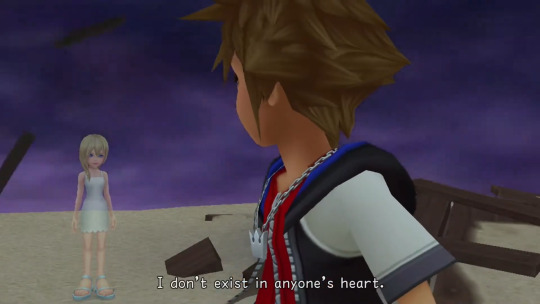
it got me thinking, and i think that kairi purposely did something to sora's memory at some point in their lives. The exact when i'm not too sure, but she had inserted herself into some of riku's part in sora's life as sora's taisetsu na hito (special someone)
i know this sounds crazy, but i think there's a valid reason to this theory
Why??
the motive is clear: that kairi is lonely. i personally relate to her character struggle, loneliness can be suffocating, just like how namine portrayed hers that resulted to the events in COM
kairi's main theme has always been about 'seperation' and being left behind by sora and riku. so it would make sense for her to crave attention
kairi might feel sad that sora and riku doesn't pay attention to her unlike how they pay attention to each-other, so i don't see it as off character for her to insert herself into a fake picture if she had the chance, especially as the love interest of her crush

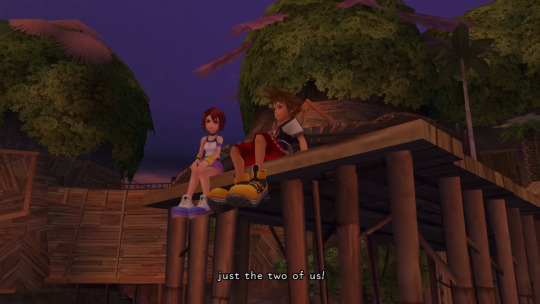
she even said this back in KH1 which sora responded with "Huh!? What's gotten into you?"
or is it done out of malicious intentions? there might be a possibility for that, but i don't think it is as it goes against kingdom hearts thematic story that stays consistent over the years, that portrays every character struggle in a sympathetic way that honestly you can relate too
(xehanort is even a subject to this in dark road)
i think that kairi felt really guilty about it and didn't realized the impact that she had done to sora and riku's relationship. or maybe she thrived for it, because even if the affection is not real, kairi is still loved and remembered by someone as their precious person, and it feels nice especially with someone like sora
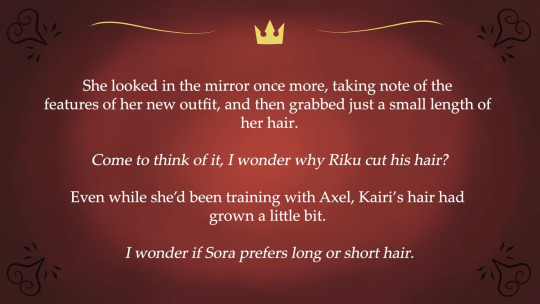
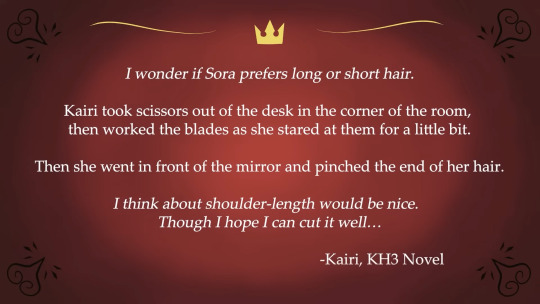
snippet from kh3 novel
in the novels, there's a strong hint that kairi cut her hair because riku cut his, which contributes a lot to the theory of kairi wanting to be sora's precious person (riku) where she somewhat mimics his behavior (she probably realized deep down sora cares more about riku than her)
Passing Memories
i think this also made sense lore wise, because why else would sora suddenly lost his memory of riku? and i don't think sora's sort-of infatuation with kairi is caused by comphet alone
forgotten promises is a recurring theme in sora and riku's relationship, everything up to this point has always leads to hidden thoughts and burried memories, you have to dig deeper if you want to find a connection between sora and riku, the examples currently are:
whatever is happening between soriku
passing memories jp name of oblivion keyblade that is owned by roxas
riku is the TRUE light
necklace theory: the fact that THE necklace is everywhere in the game but is never brought up like ever
aitsu (check full discussion on the internet)
COM the game (just everything related to COM, the only game with riku and sora beside DDD? it's sus if you ask me)
compared to sora and kairi who's relationship always seems shallow and on the surface. i think it made more sense with the 'why' factor answered, because every time sora is thinking of riku, kairi would replace herself in his position, just like the light-tunnel scene in kh3
the 'oathkeeper' (promise charm) and 'oblivion' (passing memories) also reflected sora keeping his promise to kairi, but forgetting about his to riku, riku might not be affected in the same way that sora does, so this happens:
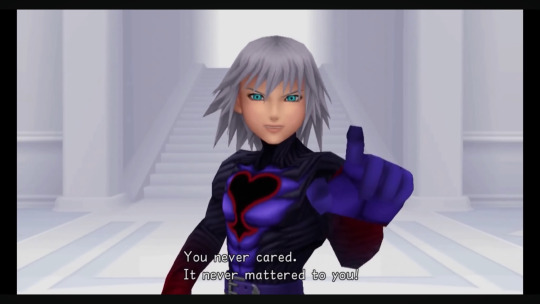
+ the multiple and many instances, riku is straight up covered by kairi
some of those instances:
kairi is true darkness (ex: sea is metaphor for darkness)
xion (is said to be kairi but proven also to also be riku)
the final world
Power?
honestly, i think kairi is more than she lets on (like LUXU), let's talk about her nobody:

i think it's already suspicious that namine has the power to mess with sora's memories (because she's from kairi's body and sora's heart?) when existing nobodies like roxas and xion for example has powers directly tied to their somebodies (kingdom key), xehanort doing xehanort things, marluxia possessing the same rose petals as his somebody counterpart, (and a lot more...)
so, with a game like kingdom hearts, does namine's powers really came out of no where? we know that sora doesn't have the ability to manipulate people's memories, so who else could it be?? kairi's powers might even be more powerful
this would also aligns with the theory 'riku is light-kairi is darkness' because even at front value the game is telling you 'hey kairi is LIGHT and riku is DARKNESS' time and time again its always the reverse in certain situations, but you never got to wonder what it actually mean
yes riku is the light, but why is kairi the darkness?? yes she sort-of brings demise as xehanort's pawn, but is it really just that?
lastly, kairi is a princess of heart, and might even came from the lost masters era as it is decorated and spammed with stars (every symbol is replaced by stars i'm not joking)
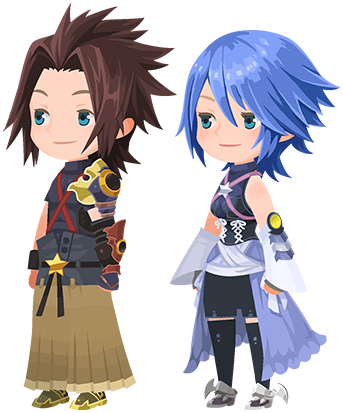
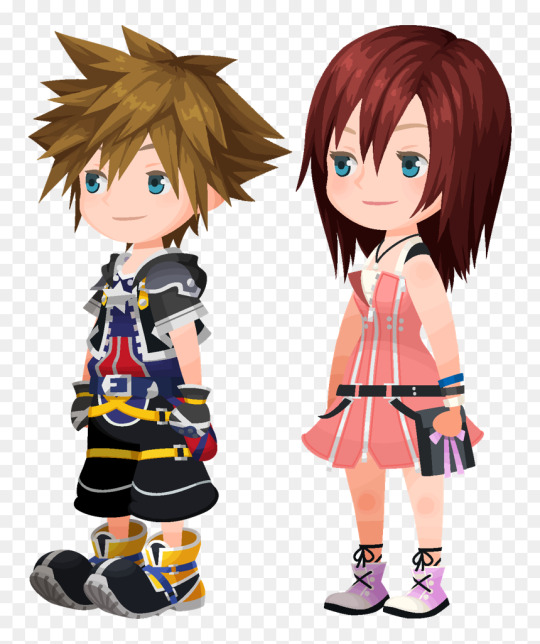
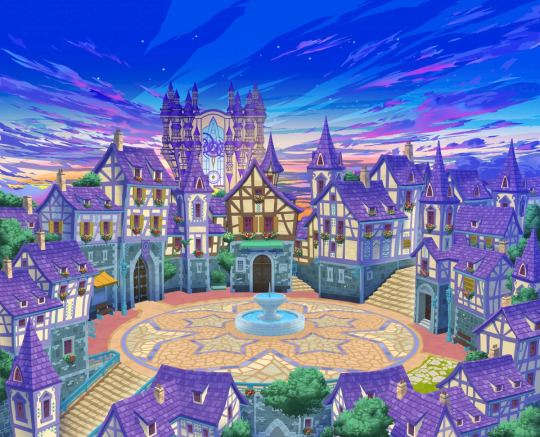
it's very on-theme with the 'traitor' plot point that has been consistent in every khux game, so... (i have a theory that kairi is master ava, or master ava is her grandma, OR kairi is mom... or skuld)
in addition to all of this, i also think that kairi can also be a creature, maybe she's actually a chirithy:
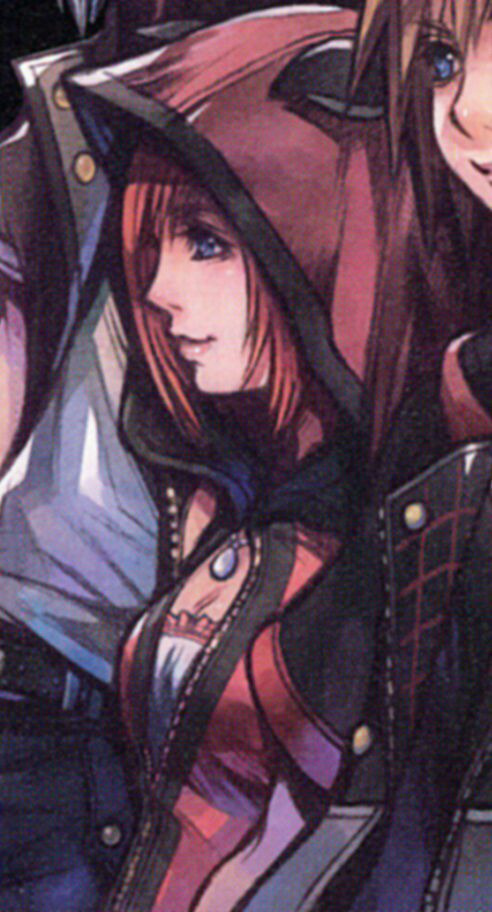

however i do think as opposed to riku as a dreameater (spirit), kairi is a nightmare chirithy, as seen in their color pallet (might be a coincidence but who knows)
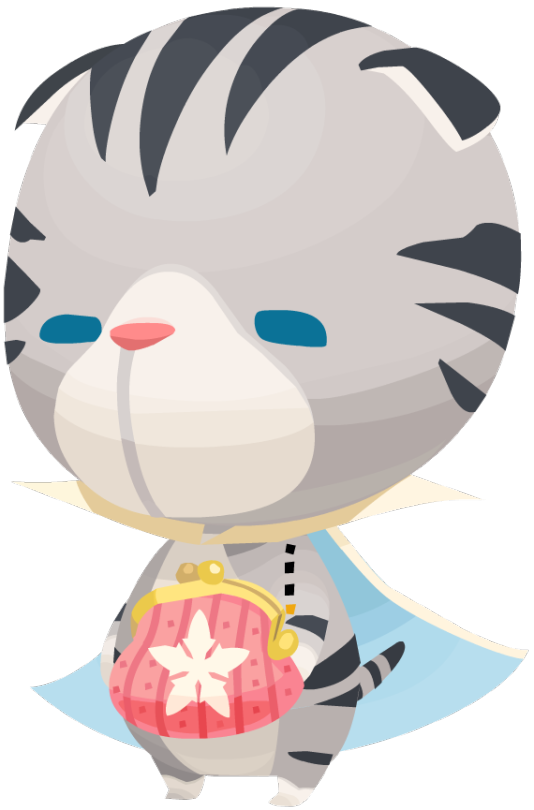
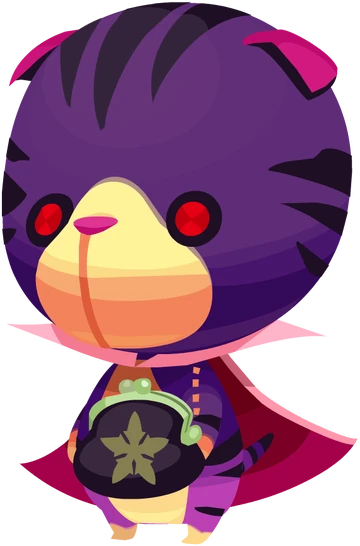
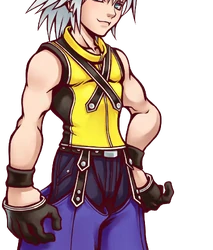
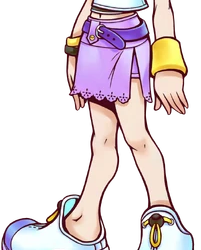
#kingdom hearts theory#soriku endgame actually#soriku#kingdom hearts meta#kingdom hearts analysis#kh meta#kh speculation#kingdom hearts speculation#kh theory#riku is the light
61 notes
·
View notes
Text
Koushirou Izumi's clothing style - a meta analysis
When it comes to Digimon and fashion, you can tell that certain characters have - mostly consistent - preferences. Most obviously, every character has colours they are usually (but not exclusively) wearing, certain motives and symbols keep returning... And for some characters, their choice of clothes is - more or less - arc-defining.
While looking for references for some art pieces on Pinterest, I stumbled over one of my favourite Digimon Adventure 02 concept artworks:
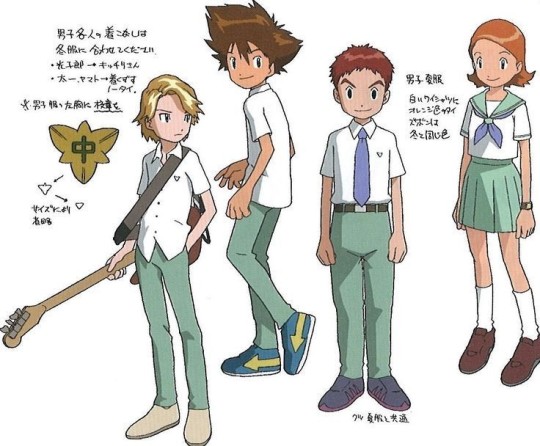
We never see Taichi, Sora and Yamato wear their Summer uniform in the series and Koushirou literally only wears it in one episode - but looking at the ensemble here, there was something that caught my eye specifically. And this observation took me down a little rabbit hole in terms of what exactly Koushirou's style is, how it changes through the series - and what it may mean for his character as a whole in my humble opinion.
It simply felt like the perfect opportunity to post all these ideas as a contribution to @izumikoushiroweek 2024 and the prompt "Dressing Koushirou".
Adventure (+ Our War Game), age 10-11:

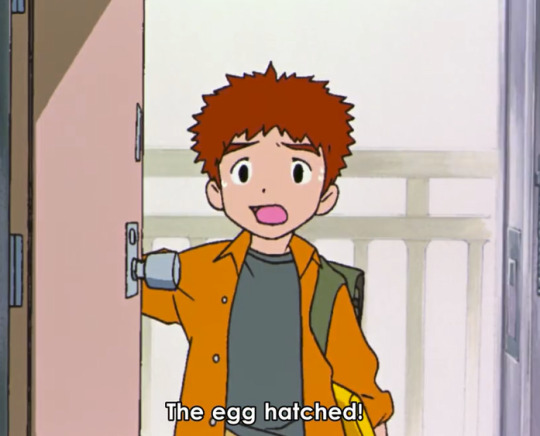
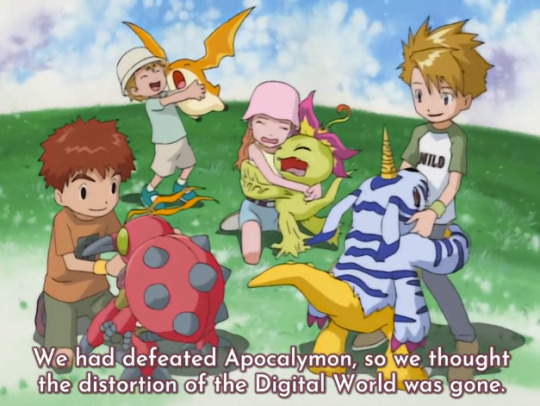
Analyzing Adventure won't take too long, because we don't have a lot of variety at this point - however, it still gives us the baseline for what we will have to expect for the entirety of the series.
Koushirou wears very "boyish" clothes that can be, more or less, considered to be common for a "computer nerd" in the 90s and early 2000s; wide, if not oversized button-down shirt (big emphasis here!), t-shirt, wide shorts, (colourful) sneakers. It's all "comfort over function" at this point, because, as pointed out, he seems to prefer wide clothes. While his signature (crest) colour is purple, his favourite colour appears to be orange, and there are usually lots of earth/nature tones too.
Honorable mention goes to his trademark Japanese school boy undercut hair with a middle parting, barely able to tame the spikyness.
So let's see what elements he will keep and what will change:
02 (+ Diablomon Strikes Back), age 13-14:

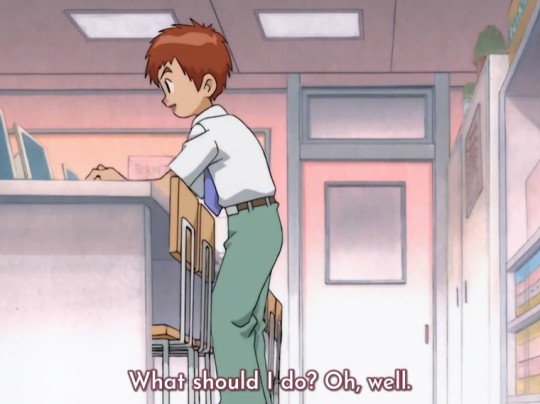


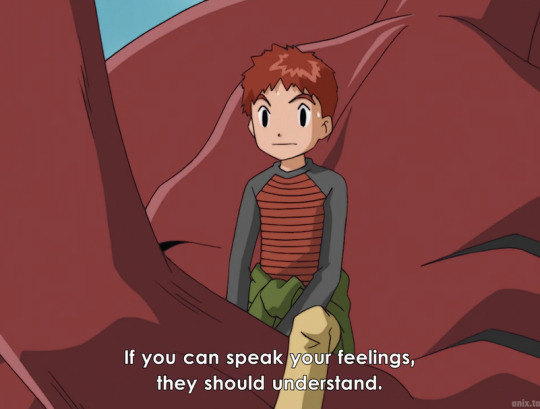
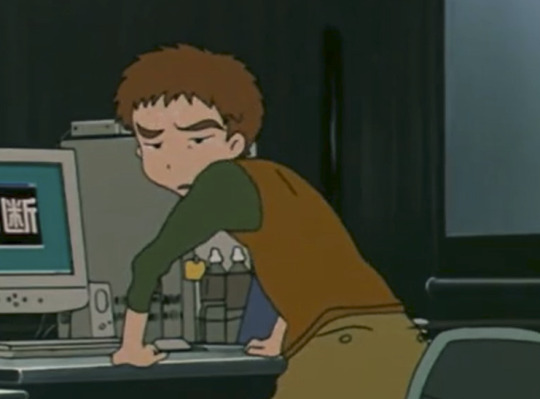
As mentioned, the concept art above was what inspired me to make this post in the first place - because I couldn't help but notice his pants there. If you compare the way he wears the Summer school uniform to the way Taichi and Yamato wear it, three things come to mind:
The older boys wear the shirt very casually, whereas Koushirou has tugged it in - which is definitely a change to how loosely he wore his button-downs before.
Taichi and Yamato also don't wear ties in comparison to Koushirou. So far so good, these are the most obvious aspects...
And then there are the pants - which are particularly less "form fitting" than it is the case for Taichi and Yamato. Considering how he used to wear wide shorts in Adventure before, one may think that this is related to "comfort over form" again, but it collides a little with how "correctly" he wears the rest of the uniform. So my assumption here is: In one of the dramas he mentions "one of the female 5th graders in computer club who is taller than me" and we can definitely assume that he was referring to Miyako there. He says that he is "working very hard" to catch up... Which leads me to believe that he wears wide pants in anticipation of getting a growth spurt. Which is not only practical in general - but would also spare him/his mom the stress of constantly buying new uniforms.
In sum, we learned that he is the only male character in the entire season who wears his uniform correctly - with the spunky shoes being the only glimpse of "individualism" there. This is an interesting contrast - and will actually turn out to be quite a pattern for him: When it comes to important duties and business, he will make sure to wear his clothes appropriately and neatly (which, at this point, is important if you consider him taking so much responsibility for the 02 kids as their team mom dad). Outside of that, we still see the habit of wearing more comfortable clothes:
Koushirou definitely likes to wear layers (similarly to but not in the same way as Taichi btw), the good old button-downs or hoodies over shirts in particular, it's all very cozy and simple - and while he hasn't completely abandoned his associated colour orange, he seems to have adopted a second favourite colour to his wardrobe as an addition to the earth tones: Green. We later learn that his mother used to buy the clothes for him, so based on her excited expression in the first shot, watching him put on his green school uniform blazer for the first time, they may have realized how well the colour complements his red hair. The wide shorts and pants are also still there and he also seems to prefer basic long-sleeves (and stripes) at this point (which may or may not have been inspired by his own Digimon partner's colour schemes, very sneaky).
Last but not least we have the hairstyle - he's been growing out the undercut to even everything out and starts the season off with a VERY short cut and a side-parting. Very neat and, at first glance, very easy to tame, since the spikes are a lot shorter at this point. The side parting did not last for long though, so the middle-parting returns through the course of the season and he also grows it out a little.
Overall, the dichotomy of "business serious-casual" and "comfy-cozy" is already coming through, but we haven't come to the heavy lifting yet:
Tri (+ the Stageplay), age 16:
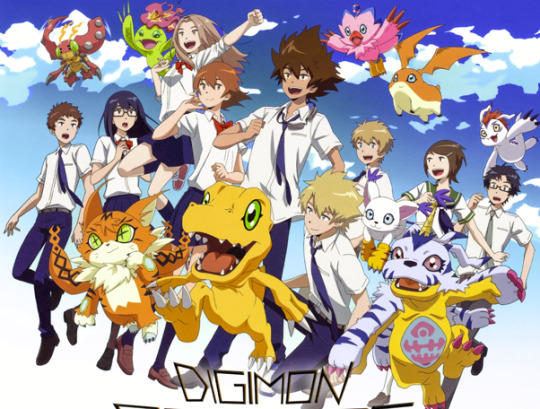

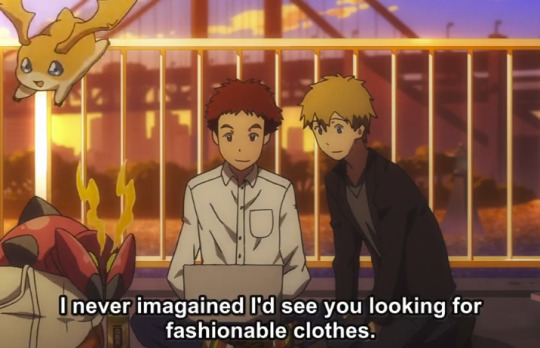



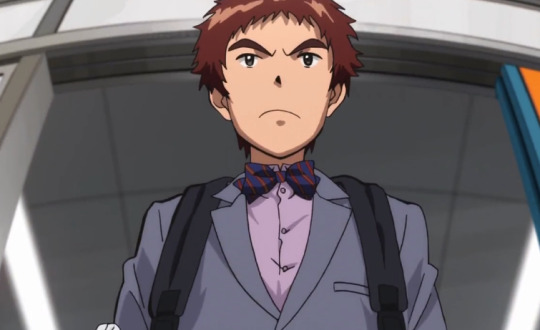

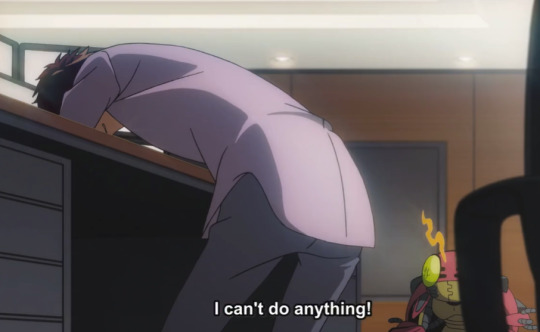
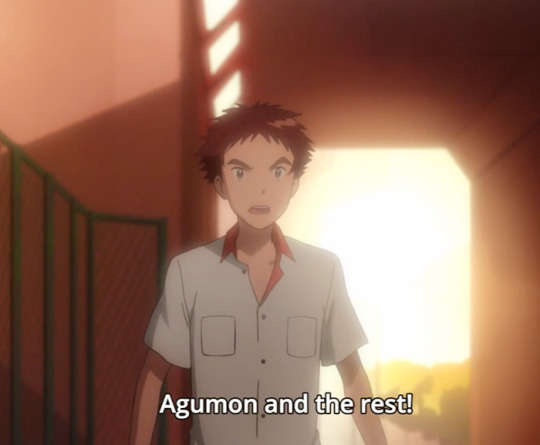

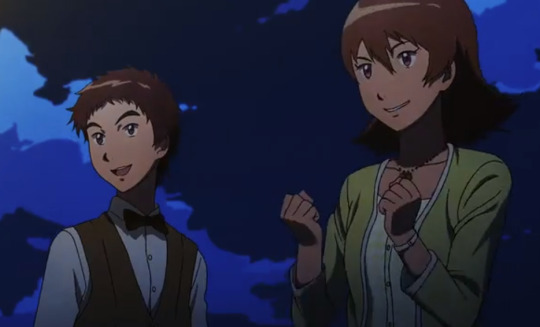
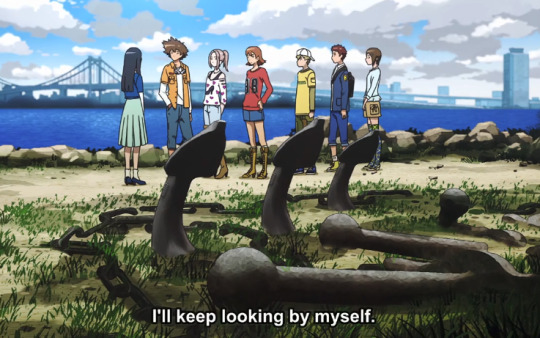
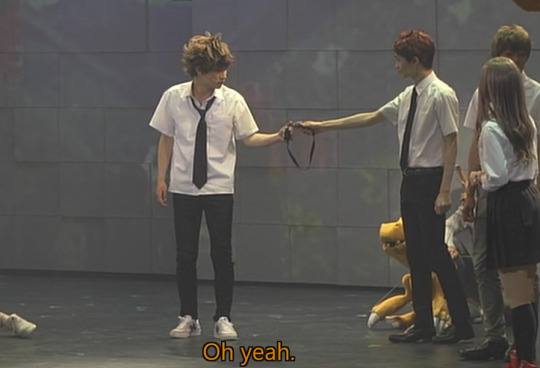
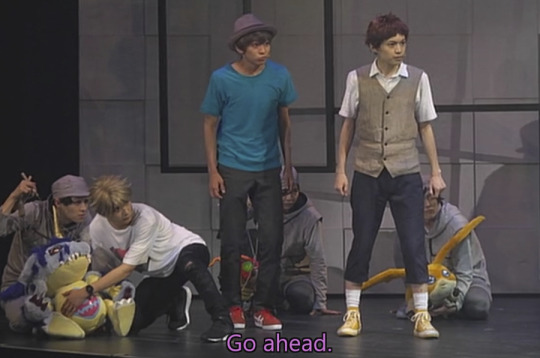
As I have briefly pointed out in the intro, for some characters, fashion is an arc-defining factor. For teenage!Koushirou, his interest in fashion is basically a B- or C-plot that - in my opinion - could have been handled in better ways, but I will get to that.
First of all, let's start with the "easy stuff": Hair and uniforms.
His way of wearing his uniform hasn't changed much from 02; he is still wearing blazer, shirt and tie "correctly" - but his pants are not as wide as they used to anymore, as can be seen on the promo art I have used above. (Since he has surpassed Mimi in height and is basically as tall as Sora, he may not expect to grow much further, so he probably chose more fitted pants at this point.)
The hair, especially the spikes and middle parting, are still pretty much the same and thus - probably - still very difficult to tame. It's notable that he has grown it out more in comparison to 02 though.
Now onto his private wardrobe: We see him confiding in Takeru, telling him that now that he goes to high school, he intends to pick clothes for himself, but... Shopping has proven to be quite difficult for... Various reasons. So instead, he created a software to generate outfits for him, with... Varying degrees of success. So through the course of the first few movies, it's heavily implied that he's making use of that software and also Takeru's advice - who appears to be a little bit of a mix between a "k-pop-fanboy / hobby-novelist with a Starbucks order in hand" and "an absolute fashion disaster" himself, but he seems to enjoy being Koushirou's wingman and assumes that his sudden interest in fashion stems from him wanting to impress Mimi.
And this is where things get a little more complicated. I will not go into too much detail about why I think that this was the wrong approach for his arc, because I have already talked about it in full length here. To summarize it very shortly: Koushirou's arc had ALWAYS been about him learning to be himself. That him being the way he is is perfectly fine and that he doesn't have to hide his true self - being adopted, smart, into computers, with all his flaws and quirks, whatever it may be. Him trying to bend over backwards to impress somebody else contradicts his arc and the only reason to include it at this point is for him to come to the same conclusion again. Of course there are underlying insecurities all over the place - especially since he actively seeks Mimi's approval. The school festival should have culminated in a scene in which he and Mimi - dressed up in a costume that was heavily criticized before, thus criticizing Mimi's way of being as well - should have had a talk that went along the lines of: "You know what? It doesn't matter what you wear, as long as you are comfortable." (Which... In itself leaves room for a lot of subtext as well, but I will get to that by the end of the post.)
So long story short, what we see through the course of the first three movies is him being quite experimental: Overalls, wild patterns like koi karps, lots of layers and a peculiar interest in bowties... He also adds several new colours to his arsenal, reds, blues, even his signature colour purple makes a prominent appearance. All for the sake of appearing "less plain", and to have more variation in his style.
While he has abandoned shorts from his wardrobe at this point, he - just like Taichi - likes to wear 3/4 length pants. One style of clothing he hasn't abandoned is his button-down shirts and (open) collared shirts in general. This has been a constant so far and I doubt that we will ever see it change, since they basically feel like "comfort clothes" for him. The interesting part here is, like we discovered before, the consistent contrast between "private" and "important occasions/business settings":
Once he's out with his parents for their anniversary, once he shows up at the school festival in a whole suit, once he wears his school uniform: He WILL wear the (bow-)tie correctly, the collar will be tight, the shirt will be tugged in, no funky shoes either.
Once he's in a private, less "official" setting, the collar will be more loose (!), the shirt will (most likely) be pulled out of his pants, the style will be more comfy, the shoes will be more "funky."

We've seen that since 02 already and it's nicely represented in Tri as well - the stageplay even dared to merge two of his outfits from the first Tri movie, a casual and a serious one, to create the perfectly "nerdy" mix for him: (Shortened) Shirt and vest from the anniversary (with an open collar and without the bowtie), 3/4 pants and yellow sneakers from the "let's look for distortions" scene. So we can tell - he DOES have preferences and may not even need a software to tell him what he naturally gravitates towards!
So let's fast forward a few years to see how it'll all develop...
Kizuna (+ The Beginning), age 21-23:
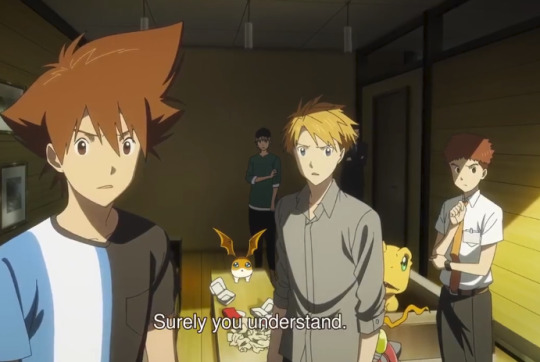
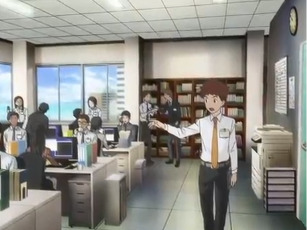
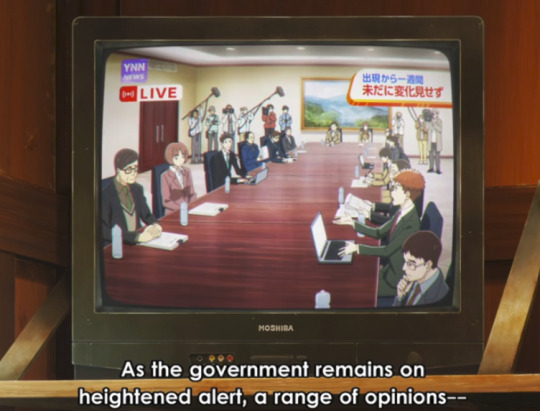
Unfortunately, we don't really get a glimpse of his private wardrobe as a young adult - but we can still be pretty sure that the patterns we spotted before are still going strong:
First of all, it can be assumed that he stopped experimenting for the most part: The hairstyle went back to the roots, for whatever reason he returned to his elementary school undercut, the middle parting and spikes are still there, but less wild. The associated colour orange also returns - and even makes its way into his business wardrobe, as he is back to wearing neckties instead of bowties.
That aside, we mainly see him in his work attire as the boss of his own tech company: White shirt with the orange tie and a closed collar (short-sleeved in Summer, long-sleeved in Autumn), black pants + brown belt, black business shoes.
And once again: Depending on his surroundings, the difference in how he presents himself is still intact to some degree: The outfit is still the same, but once he's just with his friends, shirt and pants appear to be wider again, whereas they seem to be more tailored once he is in "business mode" - this can be seen in particular in The Beginning, where he function as PR Digimon expert and gives interviews to the media.
Long story short: He kept his dichotomy alive for the majority of the series.
The epilogue, age 38:
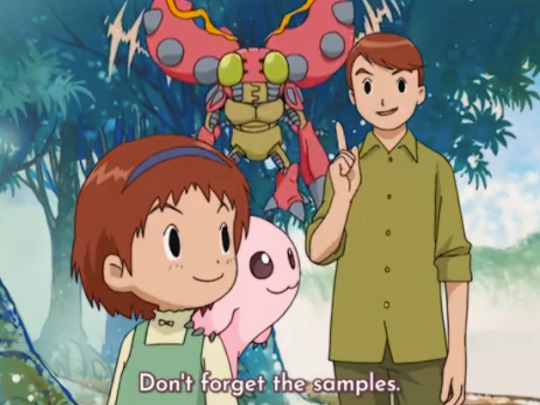
Even the epilogue shows us that he could never give up the wide, collared shirts (wide collar, no tie, pulled out of the pants!) in nature tones after all. The most notable part here is probably the hair - not only did he grow it out to the point that the spikes vanished almost completely (aside from the long, pointy bangs), but he apparently managed to FINALLY get the side-parting going after all.
Final thoughts (and a few headcanons):
I've once conducted a whole post on how I felt like Koushirou broke a few gender stereotypes in interesting ways for a series that was created in the 1990s and early 2000s (and not only because he was the only male character who basically never had a male voice actor or because 02 basically turned him into "the mom" of the group). I feel like it's no coincidence that his arc and the way it is portrayed actually speaks to a lot of people who consider themselves as neurodivergent, non-binary or trans. It's a story of self-acceptance, about someone who used to question his whereabouts, who didn't know where he came from, who he was. He didn't consider himself to have much "worth" aside from being a human extension of his laptop and also tended to mask his insecurities (at least in front of his parents) with a polite and very correct demeanour.
The way fashion is interwoven into it all may not have been conducted perfectly, but the fact that it is tied to self-discovery still leaves room for interpretations and headcanons. While his personal clothing style has always been rather "boyish" (and not feminine in the slightest), him gravitating towards oversized clothing in private settings while conforming (!) to a very correct and neat dressing style for important occasions still is a curious contrast in this regard. Hiding behind his computer, hiding behind a software to tell him how to dress (and being uncomfortable going shopping physically), hiding his generally slender body behind (mostly) wide clothing because he may - or may not - experience something along the lines of gender-dysphoria is a headcanon that a lot of people can relate to. Especially if you take Tri overall as a metaphor for him figuring out "his preferences" (in both sexuality and gender and thus the scene in which he looks at a kimono - presumably made by Sora - will forever live rent-free in my head, especially because it is a more feminine piece this time).
In the end, it can all be just a matter of perspective - the most likely explanation is that he simply prefers comfort in private settings, but can easily adjust towards a "serious business mode" whenever the situation requires it. Through the course of the series, you may argue that the characters that had the most influence on his casual style were Taichi (layers), Mimi and Takeru (being a little more experimental). On the other hand, you may also take Tri as your average "the nerd cannot talk to women and doesn't know how to dress, so he makes disastrous choices" trope and call it a day. But personally, I feel like, since Koushirou does have obvious preferences that are mostly consistent, it really is more a period of self-exploration. And like I said before: I wish the outspoken conclusion for him had been: "As long as you feel comfortable, you can wear whatever you want."
#koushirou izumi#koushiro izumi#izumikoushiroweek2024#izumi koushiro#izumi koushirou#izzy izumi#my two cents#meta#digimon#digimon adventure#i love overanalyzing my favourite character
74 notes
·
View notes
Text
One thing that particularly annoys me about the Kai Winn hate is how it strips her of her actual power.
I've seen so much people comparing her to their catechism teacher or another uber-catholic conservative woman of their life, and... she's the most powerful Bajoran in the show! She's the Kai, at some point she seems like the de-facto head of diplomacy, and for a moment she is even the head of state! She has 2 Coup attempts on her record!
Even before she's elected, she's a proper dangerous reactionary, with a political doctrine and an important base of followers. Along with Dukat and Weyoun, she is THE political character of the show. And she's so grey! So real!
I don't want to compare her to one of today's fascist either, but I feel she's kinda similar to De Gaulle ? (One of the leader of the French resistance and post WW2 political leader, and then president.)
Someone with an authoritarian doctrine who became a face of liberty and resistance (more or less peacefully). A radically Conservative politician who rose to prominence because of governmental instability, and strangely became a voice of moderation and stability. Someone "respectable".
Definitely an opportunist but also they haven clear limits. Her line is "No Cardassia, no Federation", but it really is No Cardassia first. Unlike Jaro.
Some info about De Gaulle to make my points : During the Algerian war of independence, the putschists of Alger wanted him to take power in a new military government. He declined their offer but immediately was named 1st minister by the president. And then... he instored a new Constitution tailored to his view of France. Does anyone see where I'm going with the comparison?
Back to Adami. They toned it down a lot after her first appearance, but she has this criminal side that's proper to fascists. I'm pretty fascinated by Bareil's view of her. She tried to have him killed, and then blackmailed him, and he's like "Maybe it's the will of the Prophets. She will need our help."
When it's Dukat, it's all "he's so charismatic and complicated tho", but the best Kai Winn get is "Louise Fletcher makes me hate her so bad!" Honestly, I think she is more complicated and interesting and grey than he is
The fandom rarely undermine his power. Same for the other villains who are actually "evil" : Lady Founder, who is too frightening to undermine, Intendant Kira and Emperor Gieorgou (probably because of the Camp factor), and the Borg Queen.
And I don't think Winn is evil. She's a realistic authoritarian/reactionary. In the end, I think she does care about the Bajoran people. But she thinks she knows best, she think they need a strong hand and she's the best qualified
#Jaro I kinda see as Petain#An apparently moderate and respectable politician who turns out to be a fascist#but Im getting carried away#I think they're actually my two favourite Star Trek villains#kai winn#winn adami#star trek#ds9#deep space 9
134 notes
·
View notes
Text
So, Veilguard was bad and Dragon Age is probably done forever. What now?
If you, like me, spent the past ten years in anticipation of the next instalment of your favourite series of all time, and were then grossly and horrifically let down by what we ended up getting, you're probably feeling pretty bummed out right now. You might be wondering if anything out there will ever make you feel how Dragon Age did, and may be at a loss for what media to develop unhealthy levels of attachment to next.
With that in mind, I have compiled a list of my own personal, 100% Dragon Age fan-certified recs across media of all types. In the interest of presenting these in a way that feels more relevant in comparison to Dragon Age itself, I will not be grouping them in any kind of logical category but will instead be going purely off Vibes. I will also not be listing in detail certain titles that I think are too well-known to be useful in this list - namely Bioware's other games, among others. I will give brief mention of these, but I want to focus on less widely-known properties, or things that you may have heard of but have not seen recommendation for specifically from a fellow DA fan.
I may be updating this list further if I find something good to add, or if I think of something I hadn't before. And if you have further recs not present here, please feel free to reblog with your own additions!
Vibe #1: Good ol' High Fantasy
This category pertains to works that fall under the same broad genre definitions as Dragon Age, with similar overarching tones and themes. Not listed: Baldur's Gate 3, The Elder Scrolls, Avatar: TLA.
Divinity: Original Sin 2 (Video Game) - Easily my top pick for other RPGs that elicit the big world stakes and sweeping plot of DAI. There's even an EXTREMELY Solas-coded character who I won't spoil but let's just say as a Solas enjoyer myself they did absolutely nothing wrong and I would die for them. D:OS 1 is very good too, but they are both standalone stories and 2 has more of the DA feel than 1, so it takes the place on this list.
Unsounded (Webcomic) - This one hits so many DA boxes while at the same time being something extremely unique in itself. It's got deep, multifaceted characters. It's got a fascinating world and huge amounts of fantasy politics. It's got humour interposed with horror and tragedy with neither undercutting the other. It's got not one, but TWO extremely pathetic war criminal dads, who somehow are constantly at odds with each other and yet are forced together into Situations nonetheless. And it's free! Go read it right now, there's absolutely nothing stopping you.
Bone (Comic Series) - This is almost a reverse-recommendation in a sense, because I read it years before Dragon Age ever existed and is probably one of the reasons why I was drawn to DA in the first place. It's epic, sprawling fantasy but constantly grounded in the small, personal stakes of it all. Imagine an isekai but the isekai'd are from a pseudo-modern maximalist cartoon land and have been thrust into a gritty medieval fantasy. Don't let the jokes and the goofy main characters throw you though because this series gets dark.
Vibe #2: Found Family
If your favourite part of Dragon Age is the character dynamics, and you don't particularly care about genre trappings, this is the section for you. Not listed: Mass Effect, KOTOR
Farscape (TV Series) - Oh my god I am begging you, imploring you, to PLEASE watch Farscape. David Gaider has said before that he loves the show, and it's the reason Claudia Black became the voice of Morrigan. If that isn't enough of an endorsement for you, it also has THE MOST fucked up little blorbos the world has ever seen. Literally nothing, and I mean nothing, comes close to the wet cat/kicked puppy energy that these characters exhibit, and what's more 50% of them are dressed in early 2000s tight leather getups 24/7 while the other 50% are composed of the most incredible puppetwork and prosthetics you've ever laid eyes on.
Unavowed (Video Game) - This is a point-and-click adventure game about a team of supernatural investigators, and for such a relatively small indie game compared to the likes of DA, it does a hell of a job creating compelling and complex characters who you get to know and love. The opening act of the game has a bit where a monster rips someone's face off, and yet there is something so cozy about it I just can't explain.
Aurora (Webcomic) - This one has all the good found family vibes, with a cast of characters that each has their own Deal, who bicker and squabble incessantly but manage to pull together when it really matters. And when they don't, you can be sure they will Get Into It with themselves, and with each other. It's got tons of heart and soul, gorgeous colour work, and is also totally free!
Vibe #3: Worldbuilding & Political Machinations
If you love digging into theories and lore, and appreciate stories with complex fantasy politics, look no further than here. Not listed: The Witcher, Game of Thrones, Fallout: New Vegas
Pillars of Eternity (Video Game) - This is a broad rec for both Pillars games (and hopefully, if it ends up being good, the upcoming Avowed). While the gameplay is on the whole more difficult to get into and there isn't as much time dedicated to party members as in DA, PoE1 has some of the tightest, most well-thought out lore I've encountered. If the factions of DATV were a huge disappointment to you, PoE2's main focus is a handful of incredibly complex ones that pose you genuinely difficult questions about ethics and morality. Also like half the characters are voiced by Matt Mercer, it's great.
The Wheel of Time (Book Series) - The reason I didn't put this under Vibe #1, despite it being solid high fantasy, is that I didn't connect so much with the story and plot developments as much as I did the worldbuilding and politics of the series. Fair warning, this rec does come with several giant asterisks, as it is notorious for having infuriating characters and baffling gender dynamics, but if you are able to look past all the weirdness, you'll find what was clearly a lot of the inspiration for DA's world underneath. The recent TV show is... a mixed bag, but probably the only alternative to reading fourteen tome-sized books if you don't have the stomach for that.
Vampire the Masquerade: Bloodlines (Video Game) - You've probably seen this one recommended before, but if you're having a hard time getting past the early 2000s graphics and weird engine jank, let me assure you that it is well worth the hassle. There are lots of games out there that try to make you feel like a pawn in someone's greater plan, but none of them come close to matching what VTMB managed. If you like your politics and scheming more personal and visceral than grand and world-spanning, with excellent roleplaying options to back them up, this is the game for you.
Vibe #4: Fucked Up People in a Fucked Up World
This one is easily the most "hear me out, bro" category, but if Dragon Age 2 specifically is your jam, and you crave more Kirkwall energy and Greek tragedy in your life, I have a feeling you will really like these. Not listed: Arcane, Disco Elysium
Dishonored (Video Game) - This one has always been a tough sell, because despite it being, imo, one of the best designed games of all time, the way it was marketed makes it seem like a real Gamer's game, with super epic stealth powers! And badass kill animations! But behind all that, you'll find some of the most Characters of all time, including a soggy wet twink god who gives you magic powers but will be such a little bitch about it. The whole thing is steeped in potent atmosphere and incredible worldbuilding. Also everyone is gay.
Planescape: Torment (Video Game) - This is widely considered one of the greatest RPGs of all time, and though you have to deal with a fair amount of jank and perhaps a little more reading than you'd like in a video game, the design and atmosphere of Sigil alone make it worthwhile. Then there's the cast of characters, most of which are like two bad days away from becoming a supervillain and all of whom hate each others' guts. Need I say more?
The Magnus Archives (Podcast) - TMA is definitely not for all DA fans, but if your favourite part of DAO was the broodmother section, and you really enjoyed the slowly unfolding tragedy of Kirkwall and the feeling of Hawke being doomed by the narrative, you might find yourself hooked, as I did. There are also some extremely good characters in here, all uniquely fucked up in their own way, and getting to know them in between the main segments of episodes was the definite highlight for me.
That's all for now, and again, if you'd like to add to this list, please be my guest! There are a handful of things I think would probably fit here but I haven't watched/played/read yet, so if you think something extremely obvious is missing, that's most likely why.
#dragon age#datv#veilguard critical#recs#dragon age origins#dragon age 2#dragon age inquisition#divinity original sin 2#unsounded#aurora comic#bone comic#farscape#unavowed#pillars of eternity#wheel of time#vtmb#dishonored#planescape torment#tma#long post
38 notes
·
View notes
Note
You shared your La Squadra headcanons... Now what about L' Unità speciale?
// also,, I love your work! It's interesting :)

Thank you VERY much, bb!!!!! I don't know if this is the same person who asked me about my La Squadra hcs, but if this is, then I'm waiting for you in the bedroom in my new lace lingerie And it's ps2 colors again
● Squalo
Squalo is Tuscan, Tiziano is Sicilian and there are a couple of reasons for this: Tuscany is a treasure trove of the Renaissance and many precious artistic creations, and Tiziano is reference to the artist Also in Sicily is very I mean, is VERY common and in demand fish, and Squalo is literally a shark, as his stand
The accent in speech is almost undetectable, but he often uses the Tuscan dialect and actually pronounces “Tizzano”
He and Sale are brothers. Sale doesn't know that his appendix is a member of the Boss’s elite guard, but believes that he simply found a rich friend in Tiziano, which he sometimes uses with gnashing of teeth. They are also the direct personification of jokes: - I fucked your mother! - We have the same mother, idiot.
Squalo has a Stand from birth and for this reason doesn't eat fish.
Living up to his name, he bites quite often, as sharks bite the object of their adoration as a sign of courtship. (But if think so, he only bites Tiz)
Squalo loves and often goes swimming, especially early in the morning or late in the evening, and carries Tiziano with him, who, in turn, doesn't like to swim, but loves to spend time on the shore, watching Squalo, who sometimes brings him beautiful shells or stones from the bottom.
Can't stand white wine.
He knows a lot of different and ridiculous facts about sea creatures and loves to tell them to Tiziano.
Regarding the Bucci gang, has a particular dislike for Mista (this hc is based on private comparisons between The Clash and Sex Pistols and disputes between fans)
Having a difficult relationship with parents.
● Tiziano
Has the softest, almost inaudible accent, especially to an unknowing interlocutor, which is also well disguised behind purring.
The great love of Sicilians for women played a certain role in his appearance, which gave him great attention from men in Sicily and beyond. From the women, by the way, too.
Tiziano damnably loves money and is ready to do anything if he is paid well for it.
He also doesn’t eat fish, but he didn’t do that even before the stand appeared, he’s just sick of it.
Tiziano values his personal space very much and hates when it is violated against his will, but he himself does this quite often, if not constantly.
Is the information side of the Unità Speciale.
He has the habit of pampering and treating Squalo, who, in turn, is ashamed of this.
Not particularly talkative or smiling, but has a good command of the language. (In terms of speech patterns and traps for the interlocutor, but in a different sense too)
At home he has several plants, which he carefully cares for.
Father is a farmer. Doesn't maintain contact with his mother, but has a stable relationship with his father. (His dad also likes Squalo) Final screamer, but Tiziano and Squalo are just friends, at least officially (This turns me on even more)
● Carne
Carne is almost completely deaf. He can speak, but does so rather vaguely and quietly.
He's afraid of cats and I'm not going to explain it.
His height is 211. It seemed strange and illogical to me that since Carne is meant to be cannon fodder and the stand itself demands that he be killed in any case, he is very short. And the higher the cabinet, the louder it falls.
Regarding the work of Notorious B.I.G: Yes, Carne needs to be killed And he will die, then his soul in the form of a stand will crawl out of his body. However, when Notorious B.I.G. reaches the target and kills the victim, it returns to the owner’s body and restores the wounded parts.
● Cioccolata
Cioccolata is the last one who is also Sicilian for me and I'm ready to explain why: In the anime adaptation, Risotto (who, according the canon, is Sicilian), Tiziano and Cioccolata have a single, unique manner of speech, which is especially clearly heard from Cioccolata. I can’t explain it, but just listen to their voices and compare with the others, they have some kind of abruptness, “stammers” and breath before syllables.
Based on this, Cioccolata has the thickest accent.
As a child, Cioccolata wore braces, which he installed for himself. However, he still has a natural "unevenness" and his front teeth protrude slightly, causing his upper incisors to show through unless he consciously closes his lips.
He sleeps a lot, which can be attributed to his slight excitability and extreme emotionality at work, although otherwise he is quite calm and even silent.
During each new medical experiment, he tries not to repeat himself, because otherwise the process will no longer cause the same pleasure.
Despite certain inclinations, he still adheres to extreme sterility in his work.
● Secco
He has no fear of Cioccolata. In the sense that he is still afraid of him as a person and an unstable personality. However, he is not afraid, because he is firmly confident that Ciocco wont harm him.
He has a slightly sinewy, but large and elastic physique, broad shoulders, to which a significant contribution was made by the stand, which requires good training of the swimmer, and we all know what swimmers look like.
Due to the huge amount of sugar, he is very restless, nervous and twitchy.
After being with Cioccolata for a long time, he really began to forget and confuse some words or sounds.
He is a Neapolitan and knows every corner of Naples like the back of his hand, so he poses a much greater threat in pursuit here.
Cioccolata often kicks him out of the office or forces sits halfway under the floor, since Secco loves dirt.
#jjba#jojo fanart#vento aureo#tizisqualo#squatizi#tiziano#squalo#carne#cioccolata#secco#myunitaspeciale#golden wind
62 notes
·
View notes
Text
Comics mini-Comints: Dungeon Meshi
reread dungeon meshi through to the end. still such a great manga. here are immediate thoughts - if I end up having time and energy I hope I can write something that goes deeper!
ironically i was only a few chapters from the end when I stopped keeping up, but I was struggling to remember all the characters and context, so reading it through in one go was definitely an ideal way to achieve maximum impact there.
ryoko kui does a very elegant job of handling a transition from 'silly antics' to 'big dramatic fantasy' while still keeping the central thematic throughline - eating and being eaten, belonging to an ecosystem, the significance of sacrificing others to achieve your own desires. a lot of setups pay off in a way that feels meticulously planned - and of course the crux of the final showdown revolves around characters attempting to eat each other, of course the big payoff is a huge feast that symbolically unites all the conflicting factions. it is maybe a bit too neat and happy for my taste, but it's undeniably tightly executed - it never loses sight of what it's about. especially compared to something like Frieren, it's an incredibly coherent serialisation, up there with e.g. Fullmetal Alchemist.
kui's art style deserves all kinds of praise - it feels effortlessly simple, but it clearly communicates all sorts of different shapes and body types and it's really fun to see her play around with remixing the different visual elements when she switches the races around. in general Laius's autistic monster loving ways clearly reflect kui's own deeply felt appreciation for all the ways people and animals live (accentuated further by all the extra sketches the scanlators tuck in). in a way you could kinda call it like Parts Unknown the fantasy manga.
the stakes of the final conflict are interesting - there is much to be said about the framing of 'desire' and its fulfilment, of this occult idea of 'the infinite'. lots you could put in relation to other manga, and also buddhism. (in particular I really want to develop a comparison to Made In Abyss, there are so many parallels, it just might be too spicy for tumblr lmao).
one thing I really like about it is how much its fantasy dungeon-exploring setting owes to D&D and other TTRPGs, rather than videogames. monster ecology has been a fascination of that game since the early days of Dragon magazine, and Kui sharply zeroes in on some of the intrinsic conflicts baked in to that fantasy milieu, notably the lifespan thing, while smartly avoiding the traps of 'evil races'. there's some really fun nods to the weirder monster manual entries. and in a story with so many characters and factions, it does a genuinely incredible job of furnishing everyone with understandable, reasonable motivations, conflicts drawn from their context just like the monsters are explained by their ecology.
and one thing that I particularly appreciate is like... how much it is able to simultaneously understand and sympathise with a character and also show us how and why they'd rub others the wrong way. it's impossible not to like our main group, they're all such charming dorks and the manga leads you along with all the crazy rpg party shit they do, but at the same time you definitely find yourself thinking 'guy's got a point' in the kabru chapters lmao. I'm projecting hard bc i don't really know a thing about ryōko kui but laius def feels like the sort of depiction of having an autism that you can only do if you've lived it.
but yeah, it's a fuzzy ending where it all turns out well. but what's the deeper thrust of it all? there's a funny moment where marcille is like 'maybe in the end our journey is about learning to accept death' and the grouchy old gnome guy completely laughs this off as naive, because death doesn't mean anything. and indeed their big plan pays off, and falin does indeed come back just fine. but still, through all of this it asks you to bite the bullet that being a living creature means eating to survive, at the cost of other creatures, with the other side being that one day you too will be eaten. in contrast to this honest way of being is the beguiling fantasy of infinity, where all your desires are immediately fulfilled - this is shown as a dangerous path of corruption that produces madness and manipulability. having limits and rubbing up against the wishes of others, or 'doing things you don't want to do' as izutsumi's arc puts it, becomes necessary for having some kind of definition as a subject. the thing that makes the demon concrete as an entity is a desire, or appetite, that can't immediately be fulfilled.
of course we can connect this to the idea of narrative conflict. a standard advice for putting together a plot is to ask what each character wants and why they can't get it. wanting something implies movement. and indeed over the course of this story, we see that while having too many desires fulfilled too readily leads to incoherence and callousness, equally a character who is left catatonic as their desires have been eaten by the demon must be reawakened to activity by finding a new desire.
it's kinda Buddhist innit. neither the opulence of the palace nor asceticism. desires are what tie you to the world. but mixed with ecology: what a creature does to find the energy to live is what defines its lifestyle, its form.
this is probably where I'd start talking about entropy gradients and shit if i wasn't typing this on a phone at 1:30am lmao.
but yeah - it's a powerful move to go from 'D&D monster recipe show sendup' to 'living with the inherently violent nature of being an organism fated to live in a finite sum game' and yet Dungeon Meshi makes it feel natural and convincing, while remaining tremendously charming and funny throughout. ryōko kui is definitely some kind of genius, and I can't wait to see what her next act is gonna be. it's all definitely making me appreciate the act of eating a lot more.
next story on my plate is probably The Flower That Bloomed Nowhere, which sounds like it will present a very gnarly thematic contrast.
178 notes
·
View notes
Text
Regarding Alastor's Hallway Scene in Episode 5 of "Hazbin Hotel"
Good day, folks! As sweet Mimzy said, "...pour a few fingers of rye and he turns into a kitten" so let's do that. Let me set up my Redemption, and let's get into this.
*Sip, sip*
Now, this is quite an interesting thing; the phenomenon of the reactions I have been seeing particularly regarding Alastor in episode 5 of Hazbin Hotel has been ... curiouser and curiouser.
*Sip, sip*
The big question that I think we should be asking after this episode is who Alastor is leashed to---but there seems to be something else on people's minds and that is the interaction Alastor had with Husk in the hallway of the hotel. I mean, every great character needs an epic hallway scene. For Star Wars it was Vader and Luke. For Hazbin, it is Alastor. Let's explore this.
*Sip, sip*
As a society, feasting on entertainment, whether it be through books or films or a series, fans often say that they enjoy the "villain" or "morally grey" character as opposed to those who are set on their compass of goodness. I find this to be a lie that we often tell ourselves and believe completely.
Sure, we find them more entertaining and thus we favor them, but then we try to find excuses for their behavior, make it a despicable act that is done for righteous reasons. Or because we desire to see someone who is tremendously struggling or has a rather horrid reputation overcome this and prove to be a fantastic character underneath all the layers of darkness. We don't like them because they are bad. We may pity them for they often have the most tragic backstories, or we see the potential of their goodness. But we like them because we believe that everyone in their universe has the wrong perspective of their wickedness while we, outsiders looking in, see the potential of their heroics. What they can do despite everything.
That is not liking a character because they are the villain. That is liking a character because of why they are the villain and how they can overcome it.
A few examples:
Rhysand dressing Feyre up like a whore and tattooing her without her consent: well, he was doing that to protect her and help her.
Darth Vader: Mass murderer and second in command of an empire built on absolute control; but he fulfilled the prophecy of the Chosen One and had originally fallen because he wanted to save the love of his life and his unborn children.
Loki: Yeah, he slaughtered 80 people in 2 days, attacked NYC with an alien army killing hundreds if not thousands in the process, and committed genocide prior to that, BUT that's because he was severely broken and now he sits all alone at the end of time, saving an infinite amount of people.
Granted, I love 2/3 of those characters because of the reasons provided. But also because in their prime they were WICKED!
*Sip, sip*
Now let's look at Alastor.
Alastor, the Radio Demon, and one of the most feared overlords of Hell ... threatened one of the souls he owns. And now, I see people comparing him to Val or saying they hated him at that moment or now have a poor taste for him in their mouths. But ... this is exactly what you asked for from him.
*Sip, sip*
Val, who ACTIVELY tortures Angel Dust, is being used as the comparison for Alastor because he THREATENED and scared Husk after Husk stepped over the line.
*Sip, sip*
Alastor, when alive, was a serial killer. Alastor in Hell captured overlords, tortured them, broadcasted the torture throughout Hell, and became one of the most feared overlords.
He didn't do that by being "nice" or "charming." He did that by being vile and not for a greater good. He did it because, as far as we know, he wanted power. And, damn, he got it.
Demons KNOW to be afraid of Alastor. Granted, his reputation may have faltered because he has been away for 7 years but before his departure and even upon his return, for the most part, demons avoid Alastor as though he were death incarnate.
*Sip, sip*
Now, let's examine him in episode 5. Only the scene that is getting the most traction; I'll talk about Alastor and Lucifer in another post. But let's look at this scene:
Alastor and Husk in the hallway.
*Sip, sip*
Let me put some quotes here real quick:
From the Pilot:
Husk to Alastor: "Don't you [Alastor, the owner of my soul] 'Husker' me, you son of a bitch!"
Husk to Alastor: "Are you [Alastor, the owner of my soul] shitting me?"
Husk to Alastor: "You [Alastor, owner of my soul whom I have just shoved off of me] think it must be some big fucking riot just to pull me out of nowhere? You think I'm some kind of fucking clown? [even though I am contractually obligated to obey your summons]"
Husk to Alastor: "I [the one contracted to serve you and obey your commands] ain't doing no fucking charity job [even though you told me by your order that I have to]."
Alastor to Husk: "Don't worry my friend [you, who sold your soul to me so that you could keep your power because you almost gambled it all away], I can make this more welcoming [providing you with something that you enjoy even though you are contractually obligated to obey my commands without payment/reward], if you wish."
From episode 5:
Alastor to Husk: "It's nothing I can't handle, don't worry, Husker. [Proceeds to walk away, leaving the conversation] Who in their right mind would cross me? [Continues to walk away, posing the question as rhetorical and not requiring an answer]."
Husk to Alastor: "... You've been gone a while. And it's not like anybody knows why---"
Alastor to Husk: "They don't need to know. [And it does not need to be discussed further, so leave it alone.] And don't you worry your fuzzy head about it. [Drop it. Drop it now. Don't pick it up]"
Husk to Alastor: "You may own my soul, but I ain't your fucking pet!"
[Personally, I think Val would have instantly backhanded AD for that alone.]
Alastor to Husk: "Hmhm. But you are [So stop talking, just let it go, I'm letting a lot slide here]."
Husk to Alastor [the owner of his soul, who has slaughtered overlords of Hell]: "Big talk for someone who is also on a leash."
Alastor to Husk: "Aha. What did you say? [Now you have tested my patience too much!]"
*Sip, sip*
In the pilot, Husk openly and without fear insults and cusses at Alastor. And what does Alastor, the owner of his soul, do? He lets it slide.
In the one scene between them in the hallway, Alastor essentially still does nothing even though it is evident that Husk struck a nerve. At least twice over in this scene alone, Alastor gives subtle hints to Husk that it is best he just stops. And it is not like he even dismisses Husk's worries about Mimzy or even his absence. It's more along the lines of, "Oh, I know she is in trouble and came here for me to clean up her mess, but I am a bit occupied at the moment dealing with the actual King of Hell, so I'll get to it when I get to it. Just keep her busy for now." And in regards to his absence, he makes it abundantly clear that Husk is better off just not mentioning anything about it. He cuts Husk off, and essentially says, "Look, just keep quiet about it. It's no one's business but mine and I'm fine, I can handle it, so let's just leave it alone."
All the talk people say of Alastor having a big ego, oh undoubtedly, but it makes sense why Husk is in pride in this one scene alone. Alastor tells him "let it go," and moves to walk away from the conversation.
But Husk pushes. And pushes. And on that final shove, I think Husk even knows before Alastor got mad that he went TOO far.
*Sip, sip*
And Alastor still, for the most part, does nothing.
He reminds Husker that he owns his soul, pulls on the chain just to knock Husker off-kilter, and then, rather demonically, tells Husk to not EVER mention the fact that he is leashed again. Honestly, with what Alastor COULD do to Husk ... that was letting him off SUPER easy. Like, Husk should be kissing his feet that that threat was the only punishment he received for that comment.
Val? Forget it. AD would probably be filming for 3 days straight. Alastor doesn't even touch Husk.
This move is also a sense of security for Alastor, I think. Husk probably thought this was just another comment that would result in Alastor just ignoring it. But it takes Alastor by surprise and destroys his comfort. He loses himself in a fit of fury and pulls on Husk's leash to remind both Husk and himself, "Yeah, I might be leashed but I still own YOUR soul, Husk! So do not test me!"
*sip, sip*
So, yeah, Husk gets scared, as he should. Alastor is terrifying.
Should this lessen our opinion of Alastor as it seems to have done with so many fans?
No. Absolutely not. If anything, this scene provides balance to that paradox I supplied earlier; how we like the evil characters because of the good they could do but we should also like them because they are evil and should be expected to do evil things.
Alastor IS evil. He owns Husk's soul.
And yet, this evil overlord allows Husk to get away with soooo much. And when Husk oversteps, as he absolutely did, to not even be smacked by Alastor speaks volumes of Alastor's opinion of Husk.
*Sip, sip*
Here is my speculation:
Husk obviously knows more about Alastor than most. But Alastor owns hundreds if not thousands of souls. Husk is someone he calls on often, obviously. Husk knows Alastor is leashed. Faustisse, a former employee of Spindle Horse, and one of the original teammates beside Viv for the Hazbin project said that Alastor regards Husk as one of his closest friends. Perhaps not friend, but maybe one of his closest confidants. Why else would Husk know that Alastor is leashed? Granted, we cannot tell from the dialogue if Husk knows where Alastor was for 7 years or even if he knows who Alastor is leashed to. To some extent, though, Alastor must trust Husk.
In this scene, Husk violates that trust. He deserved to be threatened, reminded, and terrified. I adore Husk. He is one of my favorite characters and when I saw the hallway scene, I thought Husk deserved way worse than what he got.
And Alastor still takes what Husk had to say about Mimzy into consideration. He still tells Mimzy, a friend he has had since he was alive, that she needs to leave.
*sip, sip*
Yes, Alastor is evil. And it is soooooo good to see him BE evil. And not for a good cause but just because someone got under his skin. He owns Husk and he lets Husk off very easy. So to see him lose his temper and not even physically hurt Husk allows the nugget of possible, minuscule glimmer of somewhat kindness to linger.
I loved the hallway scene. It did a fantastic job of showing us what Alastor COULD be if he really wanted to, why you shouldn't mess with him, and how he elicits fear.
Val lords over his souls through physical abuse. Alastor does it mentally when called for. They are two totally different overlords with really no comparison to be made between them save for this: they are both evil.
*Sip, sip*
Alastor ate in episode 5 and left no crumbs. He remains, quite possibly, the most interesting character in the show. I cannot wait to discover more of him and watch him be absolutely wicked towards others.
Cheers to you, Radio Demon. If I were in Hell and had to be leashed to anyone, I would want to be leashed to you.
*Sip, sip*
#hazbin hotel#hazbin hotel spoilers#hazbin alastor#hazbin husk#hazbin hotel alastor#hazbin hotel husk#hazbin valentino#hazbin hotel valentino#hazbin hotel episode 5#hazbin hotel pilot
153 notes
·
View notes
Text
CHRIS CARTER'S MISCOMMUNICATION: "Platonic", "Cerebral and Sexy", and the Romantic Dynamic of The X-Files

(Credit to: Melissa Walker)
**Disclaimer**: This writeup won't focus on character flaws, only on delving a little bit deeper to understand a perspective.
In this post, I explore Chris Carter's "cerebral" use of the word "platonic", and parcel out his MSR opinions during the first six seasons of The X-Files.
PART I: WILL-THEY-WON'T-THEY OR PLATONIC?
In August 1993, Chris Carter conducted his first promotional interview of The X-Files. Amongst other inspirations for the show, he drew namely from The Avengers's John Steed and Emma Peel as the cornerstones of the "Fox and Dana" partnership. “David and Gillian are very bright,” Carter said. “They truly are the characters. Their relationship is cerebral and subtly sexy. Fox and Dana remind me of John Steed and Emma Peel in ‘The Avengers.’”
To a generation who grew up watching one of the (then) most widely known will-they-won't-they in television, that comparison signaled allure, attraction, and simmering sexual tension. As @observeroftheuniverse's post here highlights, The Avengers often blatantly played with the romantic pull between Mr. Steed and Mrs. Peel. This article particularly articulates how freely the writers and actors discussed the indisputable fact of "something" going on between them: Peel’s verbal interactions with Steed range from witty banter to thinly disguised innuendo. Regarding the constant question of whether they had a sexual relationship at any time, Patrick Macnee [Steed's actor] thought the characters went to bed on a very regular basis (just not in view of the camera). However, Rigg [Peel's actress] thought they were most likely engaging in an enjoyable extended flirtation that ultimately went nowhere. Writer/producer Brian Clemens said he wrote them with the idea that they had an affair before Emma’s first appearance in the series,[6] and they certainly appear to already know each other very well when Emma is first introduced. And my own post here draws descriptions and quotes straight from each characters' Wikipedia page (and notes the similarities between Scully and Peel.)
However, after years of mixed responses, one clever reporter was able to get a clearer answer out of Carter in 1997:
RS: I’ve always wondered if you watched a show called “The Avengers.”
CC: Sure. Loved it. Mulder and Scully come from those characters, Emma Peel and what’s-his-name — Patrick MacNee. He was older than she was, so it was a sort of May-September, whatever you call it, relationship. It lacked sexual tension because of that quality. But I loved that sort of platonic thing.
And now you must be wondering: how? How did he not notice Steed and Peel's dynamic while remaining a big fan of the show, especially when he described their dynamic as "cerebral and sexy"?
Chris Carter, I posit, uses "platonic" when he means to say "sexual tension without decisive follow-through."
A bold claim. I'll prove it, too.
PART II: PLATONIC DOESN'T MEAN WHAT WE THINK IT MEANS
For the longest time, I assumed this double speak of Carter's was a form of outright lying. Don't get me wrong, he has and will lie when ego becomes involved, or when he wants to bait the "mystery" longer but can't think up a cleverer sleight of hand in the moment. But the truth, from the 1990s to the 2020s, is much simpler: he is telling the truth when he refers to Mulder and Scully as platonic.
Because "platonic", to Chris Carter, means "intellectually driven, sexually interested, non-sexually equal" all rolled into one. And, since he can't find a word that means "sexual without involving sex", he settles for one that strays from making a definitive either way.
In his interviews from 1993 to 1997 (which I explore in Part IV, see below~), he insisted that Mulder and Scully were friends, yet also stipulated they wouldn't end up together "on-screen"; and when comparing them to other sexually-charged partnerships, he repeatedly underscored his preferences for relationships that weren't "overtly sexual."
The nail in the coffin was a 1995 interview for Season 3--
AD: When you first explained Scully and Mulder to FOX, was it a point of sale that this was going to be purely working relationship, no love interest.
CC: I wanted it to be that way from the get-go, although I did want there to be sort of an underlying tension between the two of them because my feeling is when you put two smart people, a man and a woman, in a room, I don’t care whether or not they’re passionate about their life and their work, you’re going to get sexual tension out of that naturally.
AD: Yeah, the sort of Harry-met-Sally-with-brains-scenario.
--and its follow-up in January 1996--
Interviewer: How important is the sexual tension between the characters?
CC: I never wanted them to jump in the sack together because it was uninteresting to me. To me, the most sexual relationships are often the ones that are never realized, consummated or even spoken about. So I wanted this to be two smart people who work together, who happen to get along very well. Through their shared passion in their work, there is a natural chemical sexual tension that comes out of that, that doesn’t ever have to be spoken about, but it works.
Well then, why the double-speak and general lack of clarity?
Chris Carter often claimed he quite literally trusted no one, a self-protective measure that sprung from two alcoholic parents. One was sometimes-abusive, the other "ditzy" and detrimentally loose-lipped; and together, they always held rank, never backing down or apologizing for their wrongs. Humor and obfuscation, then, became his primary tool-- one minute he'd proclaim, “We can’t prove that it [abductions or paranormal activity] happened, but we can’t prove it didn’t”, and the next he'd seriously aver, "I’m a natural skeptic...."
The key to the truth lies in the repeatability of his claims: his oft-voiced skepticism in the paranormal far outweighed his infrequent, one-off jokes.
PART III: WHAT CC MEANS WHEN HE SAYS "PLATONIC"
The most telling piece of information-- the dirt on top of the coffin, if you will-- was a surprisingly open interview promoting Millennium.
Chris Carter's sincerest answer to the question of the "platonic" dichotomy was also his most vulnerable; and, upon realizing this blunder, he swiftly abandoned reflection and escaped through the realms of exaggeration-- a sign that his clarity was mixed with a little too much vulnerability.
February 20, 1997:
Interviewer: In both shows, I noticed, the male-female relationship is central and idealized. In “The X-Files,” it’s platonic. In “Millennium,” there’s a sort of idealized marriage between Frank Black and his wife.
CC: My feeling is that the most powerful relationships you have in life are … not sexual. You haven’t seen Lance Henriksen and Megan Gallagher in a sexual situation on Millennium. Between them, love is understood. Love is gesture and feeling and trust, and all those things, and it’s not necessarily a physical thing.
Interviewer: And the relationship between Scully and Mulder?
CC: It’s also like my kind of idealized romantic relationship. It’s two smart people in a room, arguing something when each one has a valid point of view. It’s like good dinner-party conversation. It’s what makes me feel alive — and good about myself. And I think there’s too little of it in most of our lives and particularly in romantic situations.
Here, the interviewer turned his questions from philosophy to possibility, leading Carter to quickly disengage and strike up hyperbole:
Interviewer: You were talking a second ago about gesture, and how Gallagher and Henriksen don’t really hug and kiss. What would happen if Scully and Mulder were to hug and kiss?
CC: They have hugged. They’ve never kissed. They could kiss if it was the right time for it. They could never give big French kisses. People say, “Will Mulder and Scully ever go to bed?” And I say, “You really don’t want them to.” Because the minute they do, then, basically, when they’re in that motel on their assignment, you know, investigating the appearance of extraterrestrial life somewhere, and they decide they’re finally going to get it on, they’re going to lie there sort of googly eyed in the morning, and those aliens are just going to be running amok. They will become more interested in themselves than in the things that they need to be doing.
He wasn't entirely wrong, either: their partnership and relationship would require-- in 1997, at least-- a lot of communication to get anywhere close to romantically stable. Fight the Future's "But you saved me" hadn't been uttered canonically; and neither character had the downtime of Season 6 yet to sort through and shift their priorities. As easy as it would be to slough off his exaggeration as another example of how little he understood the characters, Chris Carter's statement-- in truth-- pointed to how well he knew their dynamic.
Still, there remained a grain of truth to Chris's drama. He viewed (views) Mulder and Scully as two characters whose sexual attraction served to aid their quest, not detract from it; and feared that anything overtly sexual or "changed" between them would inevitably distract them from saving the world.
A challenging dynamic to understand until I realized it was one he shared it with his wife, Dori.
February 13, 1996:
But the demands of his work wear on his private life. “This is the first time Chris has seen me vertical in a few weeks,” said his wife, Dori, an elegant former screenwriter who flew up from Los Angeles to squeeze in a little private time with her husband.
August 2, 1998:
I work until at least 9.30 and I always work weekends. My wife’s staying in Santa Barbara is nothing to do with any kind of marital break-up. We’ve been together 16 years. It’s more that she’d rather be there and not see me than here and not see me. We speak all the time and its actually very romantic: I’d suggest it to anybody as a way of creating connection and desire.
She would like it if I were home more often, but she knows that I tend to feel a little obsessive and understands that I would probably be miserable if I had to live my life any differently right now. I’m not a workaholic, but when something hits and it’s good, you have to obey its demands.
For Chris Carter, obsessive focus-- as confirmed and reiterated by everyone in his life during The X-Files's run-- was lived without distraction.
During another 1997 interview, he doubled down (humorously, then solemnly) on the pathos of Mulder and Scully's situation.
1997:
Question from Dublin, OH (Sunil Karve): Hi Chris. On that terrible day when the series comes to an end, are you planning on having Mulder and Scully finally get to the “truth” (and more importantly, be able to prove it?)
Carter: They’ll be too busy jumping each others’ bones.
Question from Los Angeles, CA (meredith): Recently you likened M & S’s relationship to the one in the movie “Remains of the Day”. For those of us who didn’t see that movie, what did you mean? Thanks.
Carter: I just meant, I thought it was more powerful that those two characters didn’t get together....
Question from North Syracuse, NY (Ellis): Will a romantic relationship develop between Mulder and Scully?
Carter: No romance.
PEOPLE: Ah the QUESTION…Why not?
Carter: More alien stuff is coming soon.
And yet, he took care to hint (blatantly at times) that Mulder and Scully would end up together after the nebulous, victorious conclusion. Not only as a possibility-- an inevitability.
PART IV: DESCRIBING MSR THROUGH CARTER'S EYES
Carter's descriptions of Mulder and Scully's partnership through the years didn't change... in substance, at least. His answers shifted depending on his devilish mood; but the underpinnings remained the same, all pointing to a similar, looming conclusion.
To illustrate this point, I've included as many statements as possible, barring repetition, dating from 1993 to 1997.
WRITING AND CASTING THE PILOT
"The Truth About Season One", post The Truth:
"It was very easy to cut Ethan out because he just slowed down the scenes where you would see Mulder and Scully together, which is where all the heat really was."
September 23, 1994:
I loved both David and Gillian from the start. And, yes, I chose them from hundreds of other actors who auditioned. The chemistry between them is just pure luck.
February 20, 1997:
[On casting Gillian Anderson] "You knew the chemistry was there with Dave and Gillian. That’s something you pray for, because you can’t manufacture it."
June 14, 1998:
“At the original auditions, I saw dozens of people but the moment David and Gillian walked in the room, I knew I’d found my Mulder and Scully. It was as if the skins I’d created fit these two people like gloves.”
SEASON 1
August 18, 1993:
“David and Gillian are very bright,” Carter said. “They truly are the characters. Their relationship is cerebral and subtly sexy. Fox and Dana remind me of John Steed and Emma Peel in ‘The Avengers.’”
November 30, 1993:
The relationship between Mulder and Scully is particularly promising. So far, it’s a low-voltage attraction. If it gets stronger, it won’t be because that’s the standard TV formula.
“It’s a relationship I’m not seeing on television,” says Carter. “It’s based on mutual respect, not something overtly sexual.”
SEASON 2
September 23, 1994:
LANGER: Chris, You brought back Tooms. Are there any plans to bring back the Eves or that guy who starts fires?
CARTER: Again, anything can happen. Except that Mulder and Scully sex scene.
MOONFERRET: Chris, We all know that the Mulder / Scully thing isn’t going to happen. I’m curious though– why exactly are you so opposed to this? You and the rest of the crew are great storytellers- I’m sure you could pull it off exceptionally. Why so opposed? (Do you get the feeling I’m one of the few that would love for it to happen? Call me vicarious…)
CARTER: Oh, Moonferret. If I could only make your dreams come true.
October 28, 1994:
“I had decided sometime after learning that she was pregnant (last winter) to shoot around Gillian’s pregnancy,” Carter said....
Carter considered making Scully a single mother, but he resisted domesticating the show. “I have chosen not to make the show about the characters’ lives,” he said. “The show works best as two FBI agents investigating paranormal or unexplained phenomena, and that’s what drives the show. If the stories don’t drive the show, then we’re working backward.”
December 1994:
Another source of praise for the show has been the unique relationship shared by the two main characters. Though there is chemistry between Anderson and Duchovny, the writers and actors take pains to maintain a tender but nonsexual relationship.
...As far as the sexual tension between the two goes, everyone involved in the series seems to agree that a full-blown romance is out of the question.
December 1994:
How close will Scully and Mulder get to the final truth in the current season of X-Files? Carter’s answer is as nebulous as any of last season’s answers. ‘I don’t think there is a final truth,” he says with a laugh. “There are problem final truths. We’ll just keep pushing."
SEASON 3
1995:
AD: When you first explained Scully and Mulder to FOX, was it a point of sale that this was going to be purely working relationship, no love interest.
CC: I wanted it to be that way from the get-go, although I did want there to be sort of an underlying tension between the two of them because my feeling is when you put two smart people, a man and a woman, in a room, I don’t care whether or not they’re passionate about their life and their work, you’re going to get sexual tension out of that naturally.
AD: Yeah, the sort of Harry-met-Sally-with-brains-scenario.
1995:
Q. Did you always have in mind a two-person cast, male and female?
A. The Mulder-Scully idea was there from the start. And I wanted to flip the gender types, so that Mulder, the male, would be the believer, the intuitive one, and Scully the skeptic, which is the more traditional male role. It was also important that Scully be Mulder’s equal in rank, intelligence, and ability–because in real life the FBI is a boy’s club–and I didn’t want her to take a back seat.
October 1995:
**Note**: Carter teases a lot during this interview, but his last answer is serious enough.
Melissa: The chemistry between Mulder and Scully is great. Will their relationship ever develop into more than just being partners and friends?
Chris Carter: They’ll find out they’re actually third cousins, four times removed.
Naber: With Mulder getting a girl [a topical Season 3 rumor], will we be seeing Scully having more of a personal life or a date?
Chris Carter: Scully will join a nunnery when she learns that Mulder has strayed.
Mary Paster: Rumors about a girlfriend for Agent Mulder have a lot of fans worried that this will ruin the “sexual tension” between him and Agent Scully — can you tell us anything about it to calm our fears?
Chris Carter: ...About Mulder’s girlfriend… don’t worry, I won’t let anything “ruin” Mulder and Scully.
December 24, 1995:
Q: As you know, there has been a lot of speculation that Scully is Samantha. [Agent Mulder’s sister, Samantha, was abducted by aliens when she was a child and never seen again, causing Mulder to become obsessed with UFO’s. If she were alive, she would be the same age as his partner, Dana Scully.]
A: [Chuckles] People with too much time on their hands.
Q: Can you tell fans that is definitely not the case?
A: That is not the case.
Q: There’s also speculation that Scully is a lesbian and that’s why there have been only fleeting mentions of past romance for her. Is Scully gay?
A: That is not the case either. I hate to answer anything definitely. But Scully is heterosexual.
January 1996:
Interviewer: How close to your original vision is what we get?
CC: I have to say that it’s extremely close to what I imagined. Of course, when I was sitting and writing the pilot, I never imagined episode 73, which is where we’ll be this year. Anyone who creates a show, I don’t think, can look that far down the road. But I did, indeed, have an idea about how the Mulder and Scully relationship would progress.
Interviewer: How important is the sexual tension between the characters?
CC: I never wanted them to jump in the sack together because it was uninteresting to me. To me, the most sexual relationships are often the ones that are never realized, consummated or even spoken about. So I wanted this to be two smart people who work together, who happen to get along very well. Through their shared passion in their work, there is a natural chemical sexual tension that comes out of that, that doesn’t ever have to be spoken about, but it works.
May 13, 1996:
Since the very first episode, the slow-burn chemistry between Mulder and Scully has had fans in a delicious torment, debating the pros and cons of a romantic/sexual relationship, analyzing the details of each gesture, each word spoken by the characters.
On this subject Chris Carter is adamant. In numerous interviews, he has stated that there will be a relationship between the two main characters “when hell freezes over,” as he recently said in USA Today.
May 16, 1996:
Interviewer: Do chat types want romance between Mulder and Scully?
CC: They do and they don’t. They want elements of it without them jumping into the sack. There are these “relationshippers” who kind of dominate the online chats. I’m a little dismayed because I don’t want to do a show about fuzzy warm Mulder and Scully. Never.
SEASON 4 - SEASON 5
1997:
Question from Dublin, OH (Sunil Karve): Hi Chris. On that terrible day when the series comes to an end, are you planning on having Mulder and Scully finally get to the “truth” (and more importantly, be able to prove it?)
Carter: They’ll be too busy jumping each others’ bones.
Question from North Syracuse, NY (Ellis): Will a romantic relationship develop between Mulder and Scully?
Carter: No romance.
PEOPLE: Ah the QUESTION…Why not?
Carter: More alien stuff is coming soon.
February 20, 1997:
Interviewer: If the show is ever in trouble, don’t you think Fox would push you to have a romance?
CC: Oh, sure.
Interviewer: And how strong do you think you’ll be when that call comes?
CC: As I say, I may not be here by then, so I don’t know. But I would resist it, as I think the characters would. Or the actors that play them. That’s what The X-Files movies are going to be for.
FIGHT THE FUTURE
March 14, 1998:
[John Shiban] "Chris Carter has said that Mulder and Scully, in a way, are having a romance. Even though it’s not a sexual romance, this is a relationship and it is complicated. And sometimes they are at odds, sometimes they don’t agree, sometimes they are concerned for each other, they are worried that one is going to endanger themselves, etc. Sometimes those things aren’t resolved and we like to leave it lie(?) because it makes them more real to us and more interesting people if they have that kind of long-term up and down that you go through in a relationship like this."
May 1998:
TVG: There has also been a lot of buzz in the press about a scene in which Mulder and Scully kiss. You’ve often said you wouldn’t play that card, that they will never really take their professional relationship to an intimate, romantic level.
CC: Nor should they. I’m not saying it would never happen, but I think the characters, if they’re being true to themselves, would be careful about finding themselves in that entanglement.
June 1998:
Y’know, like do Mulder and Scully kiss?
“I think it would ruin the show,” Carter says, then adds, “I think it would wreck the X-Files if they had a relationship.”
Anderson chuckles: “What? Before we spot an alien, what are we going to do? Smooch?”
Reports Duchovny: “There is way too much history to be developed for them to have a carnal meeting.”
Besides, says Duchovny, smirking, “America wouldn’t stand for it.”
SEASON 6
October 1998:
[Talking about FTF's almost-kiss]:
“I think it’s a natural expression of the love these two people obviously have for one another. And that was an expression of that love, it’s not necessarily a perfectly…” Carter drifts off for a moment, stumbling for the right words to describe his thoughts on the matter. “It’s not a sexual expression. That they almost kiss isn’t stepping over a line that I think that neither of them are quite prepared to step over. But it’s a quite believable one,” Carter insists. “That it doesn’t happen, that’s part of the fun.”
Although Carter says Mulder and Scully’s relationship will be dealt with in Season Six, he does stick firm to one of his former proclamations: “I don’t see Mulder and Scully getting in the sack.”
December 1998:
“They are VERY complex characters. We played with Mulder and Scully’s belief systems in the fifth season. They’re both unmarried. They’ve both lost parents, and they’ve both lost them in a tragic way. Mulder and Scully have a lot to learn about life, I think, and they’re things that people have to learn as they move through their 30s and on into their 40s,” CC observes. “So, I really do think we’ve got a lot more to learn about our characters and about the conspiracy. I don’t think we’ll run out of ideas anytime soon.”
CONCLUSION
I started this exercise as a way to understand Chris Carter's thinking. Seeing the early days of his vision-- poking around in the limitations of his verbiage, finding that a deeper relationship was always in the cards (even if kept back from the table)-- was informative and intriguing.
(What really interested me-- which I couldn't include here-- was the revelation that Gillian Anderson was of the same mind concerning Mulder and Scully's partnership. It was actually David Duchovny who later became curious to explore a more personal relationship between the two. Which explains The Unnatural, I'd bet.)
And that's where we leave off on this platonic miscommunication.
Thanks for reading~
Enjoy!
#txf#xf meta#mine#CC#interview#Dori Carter#DD#GA#really proud of this piece#an exercise in stretching my research capabilities#quotes#catchin up on old news#x-files#xfiles#the x files#1993#1994#1995#1996#1997#1998
105 notes
·
View notes
Text
Two takes I see that don't make much sense are as follows:
From SWERFs, "sex work is exploitative to women, therefore it should be illegal".
From pro-lifers, "abortion is exploitative to women, therefore it should be illegal".
Never mind that the pro-life argument which says that abortion is exploitative to women doesn't make sense on its own. The more essential point is: if some group is being exploited by a given practice, you want to solve that by criminalizing the activities of the exploited party? That just seems odd; it's unclear how that is supposed to help. "Sorry, we're here to arrest you for getting exploited". What is the logic here?
For my own part, I think that sex work probably is exploitative most of the time, but I can't imagine that making it illegal and forcing it underground helps much with this. Sex work is still widely practiced even in places where it isn't legal, this much is obvious enough, and the illegality impedes effective strategies of combating exploitation such as unionization, which is an imperfect but extremely powerful tool, tried and true in a wide variety of industries.
I know that SWERFs resist comparisons of sex work to other industries, but their arguments mostly seem to focus on the idea that sex work is uniquely harmful to practitioners and never really seem to answer the substantive question of why the tools developed to combat exploitation in other industries should not be expected to be useful also to the sex worker. I think this is because they are guided by this feeling that all discussion of mitigating exploitation is small potatoes, since sex work is so harmful that it should not exist at all. But even if this is true, that is clearly not a feasible situation to bring about via criminalization, as the widespread practice of sex work even where it is illegal should make obvious! It's like these people are more interested in officially registering their viewpoint that "sex work should not exist" (giving it legal codification and therefore legitimacy) than they are in actually reducing real exploitation in the real world. For a comparison: I think heroin addiction should not exist, but I do not think that throwing heroin users in jail is probably the best way to achieve this, nor do I think that it constitutes particularly just treatment of said heroin users!
I guess this is the same conversation that the left has been having with the right about drug decriminalization and harm reduction for many years. You need to make an argument better than "this thing is bad, therefore it should be illegal". That's like, a child's understanding of how the law should work, it's more complicated than that.
Now I will say that I know that there exist people out there who do sex work and enjoy it, and do not consider themselves exploited, just as there exist drug users (although probably not heroin users) who enjoy it and either are not addicted or are addicted but view this as an acceptable trade-off. To these people I say that I do not have any interest in telling you how to run your lives, and if you genuinely do these things voluntarily I think that is fine and good. You are also my allies on this front. I think that very probably the majority of sex workers are exploited, and very probably the majority of hard drug users are trapped in a vicious cycle that they would be better off escaping from, and in policy discussions around these issues I think these concerns should take highest priority. Still, though, if you just have some deep passion for fucking people for money or whatever, a priori I desire a world in which you can do that; my discussion of sex work as something to which harm reduction is a reasonable sociopolitical approach should not be construed as opposition to your ends.
62 notes
·
View notes
Note
hi Caden! did you read anti oedipus, and if yes what did you think of it? you mentioned on your post about psychoanalysis being partial to this kind of approach, and i was curious if you had specific takes on deleuze, guattari, schizonalysis as a concept or its limitations?
blast from the past anti-oedipus was the first book i ever read that substantively criticised psych because i saw some people taking facile potshots at it on this very website in like 2017 and thought it sounded interesting lmao
alright so i have to be kind of broad here but essentially my opinion on psychoanalysis is that it's not, in itself, inherently liberatory or radical and certainly not inherently at odds with or even distinct from other modes of psychiatric practice. at the same time i think there are schools and elements of psychoanalytic methodology that can be those things, ie can be used to those ends by people who have those political commitments.
on here you do sometimes see this very ahistorical take à la byung-chul han that tries to understand psychoanalysis as inherently oppositional to psychopharmacology or other forms of therapy like cbt. this is really silly and fails to understand the ways in which psychiatry can and does practice pretty eclectically (because it's a very vibes based profession so it doesn't really matter). then there's the even further offshoot of this where people act like psychoanalysis has their preferred ('leftist') political character intrinsic to it, as though professional psychoanalytic organisations the world over aren't consistently on the front lines of things like medical transphobia (eg, check intellectual affilitions on the early ROGD papers; also, lacanians in france like generally). i would include schizoanalysis in this in the sense that there's nothing about it that prevents it being implemented in biased or hateful or repressive ways. its practitioners will have their own political commitments just like freudians or any other school; you can't just rely on an analysis being rhizomatic or whatever and think that solved what is a much more concrete problem of power relations and psychiatry as a tool of class suppression.
(i would extend that to scientific ideology generally but that's a longer post.)
what i do think is valuable in psychoanalysis (again now speaking very broadly of multiple sub-schools) is, and especially in comparison to other analytic models in psychology, it has a generally better capacity to deal with experiences like 'feeling at odds with yourself' or 'feeling tormented at your own thoughts'. the psychoanalytic unconscious or the process of repression of course aren't 'real' any more than the personality types or pathological entities of biopsychiatry, but the question is, are the concepts useful? i don't really align myself to a school of psychoanalysis or think it's a done endeavour but i do personally think elements of this family of approaches have real value for how we understand ourselves. this is again, though, something that in its barest scientific scaffolding will always admit of multiple & reactionary politics: for example, freud himself (and thus many many subsequent freudians) struggled with a tendency to be circumspect or sometimes openly ahistorical about the actual origins of the mental forms and archetypes he talked about (eg, the Daddy figure & its primacy in the psychological development he discussed). on the other hand, people like wilhelm reich have tried to develop this project to explicitly contextualise these elements socially and historically and materially: Daddy is in my head not because he's some universal form of human mental experience, but because of the primacy of the bourgeois marriage in capitalist social relations. etc.
so, wrt schizoanalysis and D&G particularly, my frustration frequently comes back to their failure to actually follow through on much of this. schizoanalysis is sort of an archetypal attempt to solve psychoanalysis by ideologising around the political character of psychiatry—what i mean is, the fantasy of schizoanalysis is that we can beat capitalist repression by playing what boil down to word games with it. psychoanalysis says the subject is a single 'i' and uses this conception of selfhood to achieve its economic and carceral ends (true), so schizoanalysis will evade the economics and carcerality by conceptualising selfhood as rhizomatic (unserious). i would tentatively level this more heavily at deleuze than guattari & keep meaning to do more historical reading about the latter & his actual clinical practice. but in general i do think both made (or acceded to, bc deleuze did basically all the writing as i understand it) basically silly idealist errors where anti-oedipus/a thousand plateaus shift from an analytic of capitalism to their attempt to actually formulate an alternative.
idk, it's frustrating talking psychoanalysis (on here or irl) because on the one hand you have to contend with people who think that, like, you could just reform the sex/gender discourses of lacanianism or jungianism to be more niceys to the transgenders by giving practitioners a DEI workshop. and then on the other hand you have to deal with hardcore neurobiopsych defenders who think that their fmri scans are somehow magically exempt from being theory-laden or narrativised, and that there's nothing to gain from an analytical mode that is capable of actually applying various dialectical motions rather than the crass positivism of basically all other psychiatry since like pinel. and meanwhile almost nobody in any of these camps is like, thinking clearly or honestly about the relationship between scientific ideology and political character, lmao.
tl;dr i don't think psychoanalysis will, can, or should save us & it may even be the case that no one has ever properly done it. but like yea i do think there are elements of the method that are useful for modelling our psychology, at any rate more useful than what else we've come up with thus far. and i would include schizoanalysis as under the same broad methodological umbrella, where its goal is more explicitly to grapple with politics qua psychology (libidinal investments) but it tries to do this primarily by discursive alternatives to the established form/s of the psyche—which alternatives may indeed be compatible with revolutionary politics but does not in themselves constitute such politics. As Eye Read D&G, anyway—im aware they are not the only people ever to have written about or practiced it, & aren't necessarily entitled to last word on it.
37 notes
·
View notes